



SIGNS OF THE TIMES: AMERICA IN THE AFTERMATH






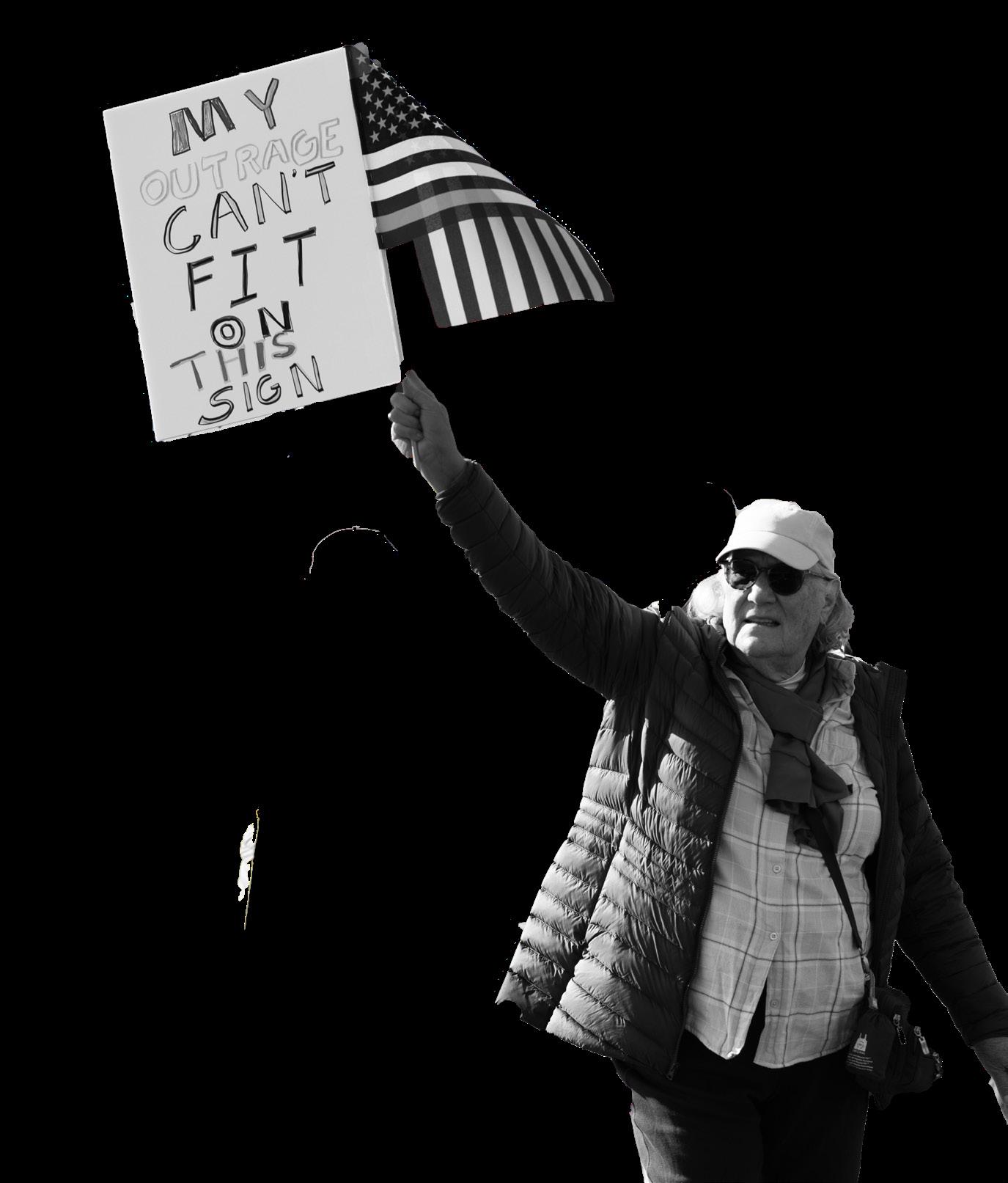

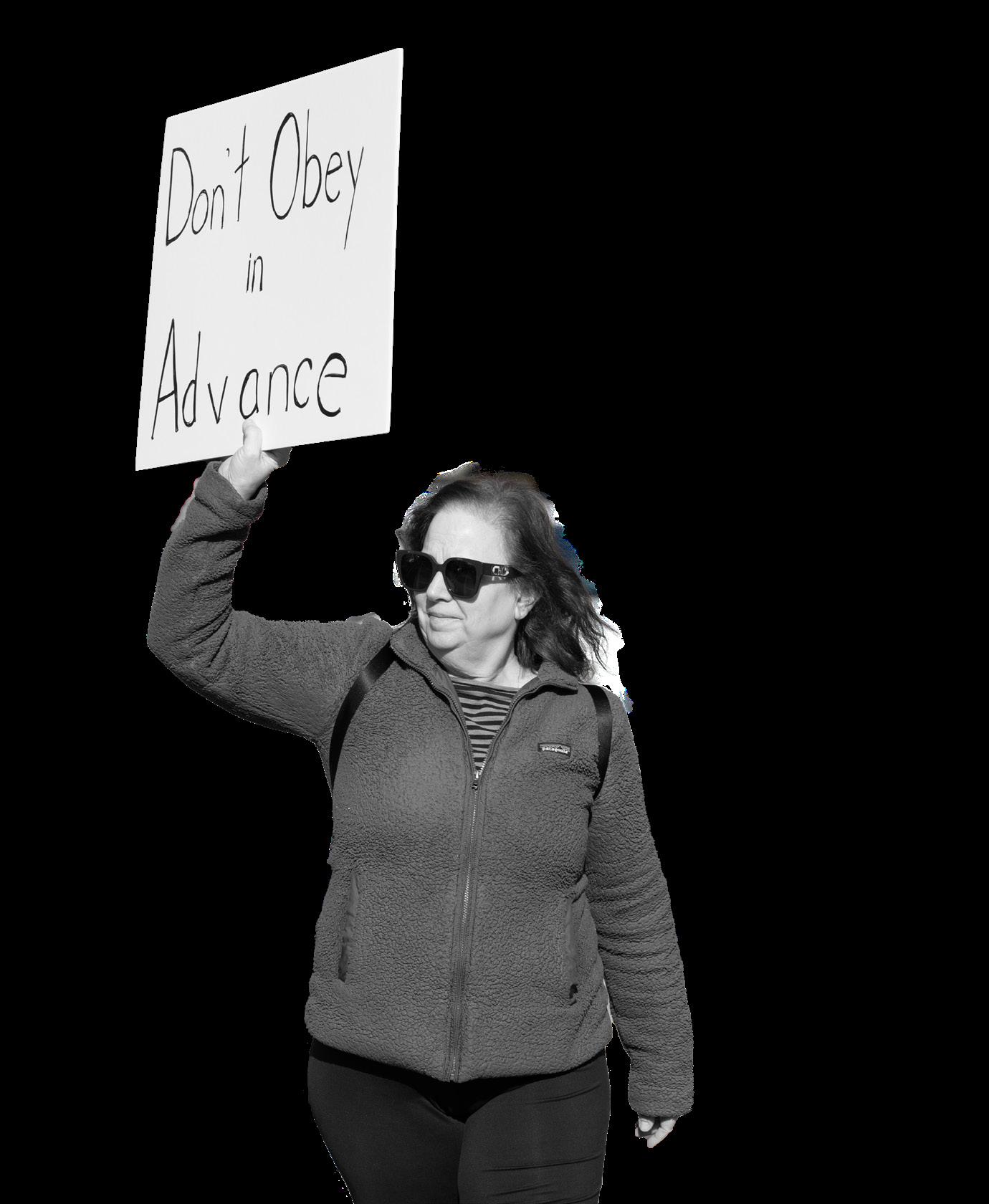

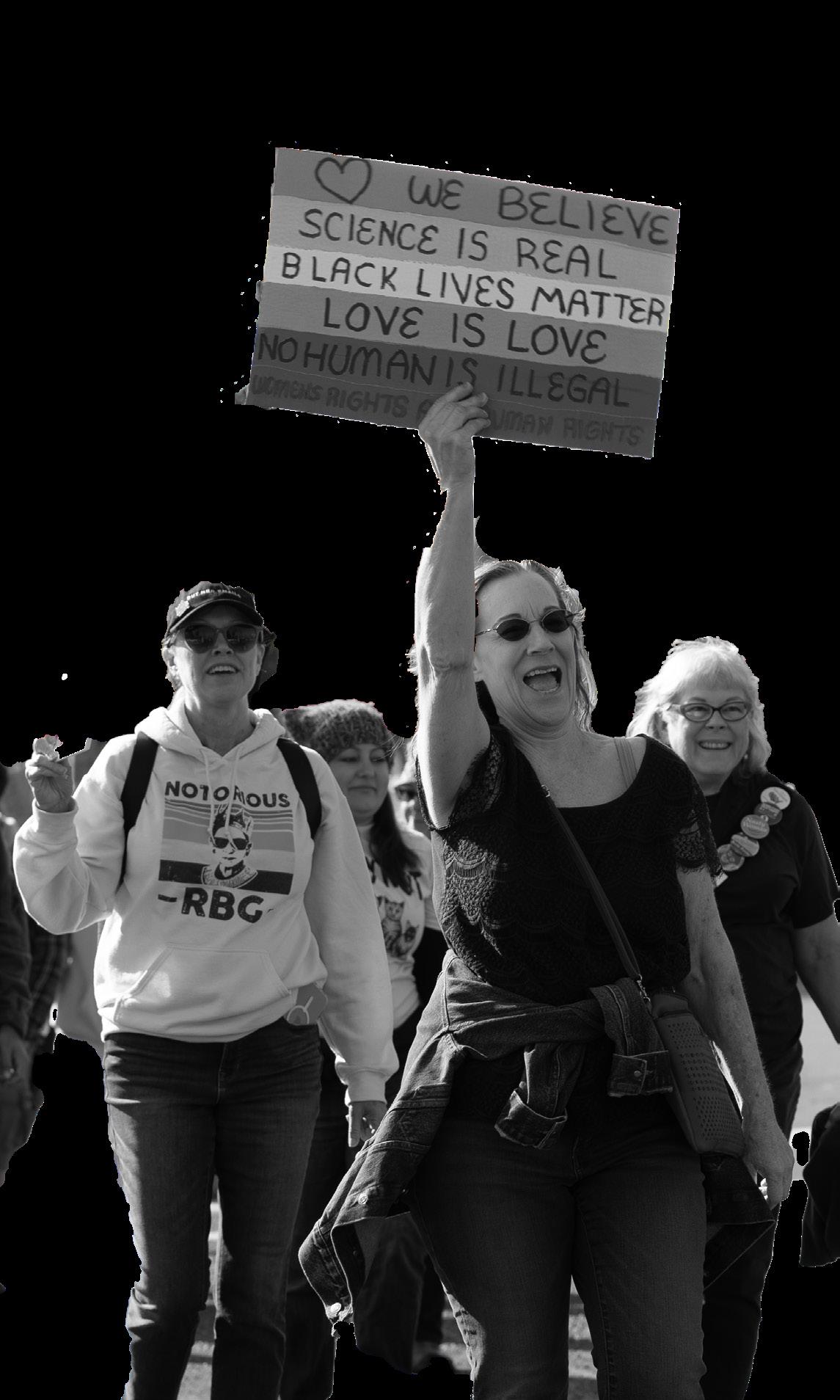
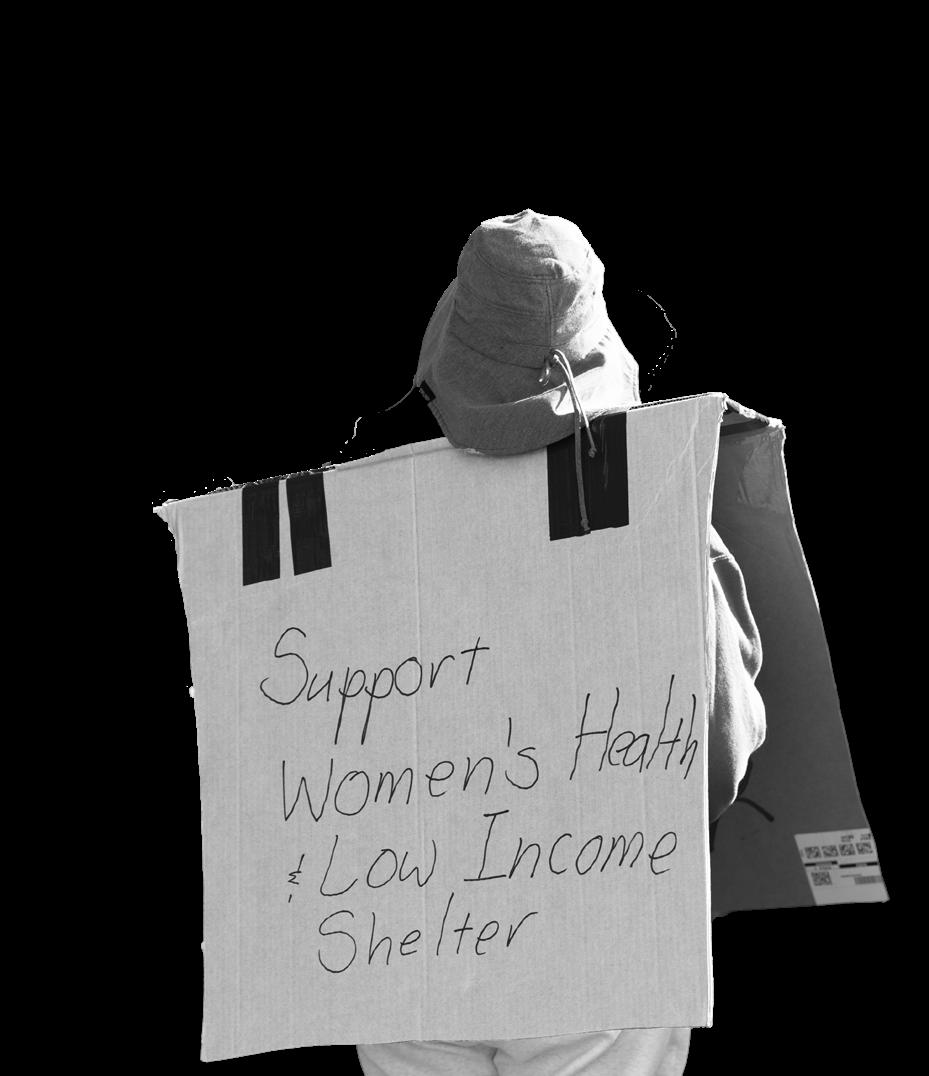



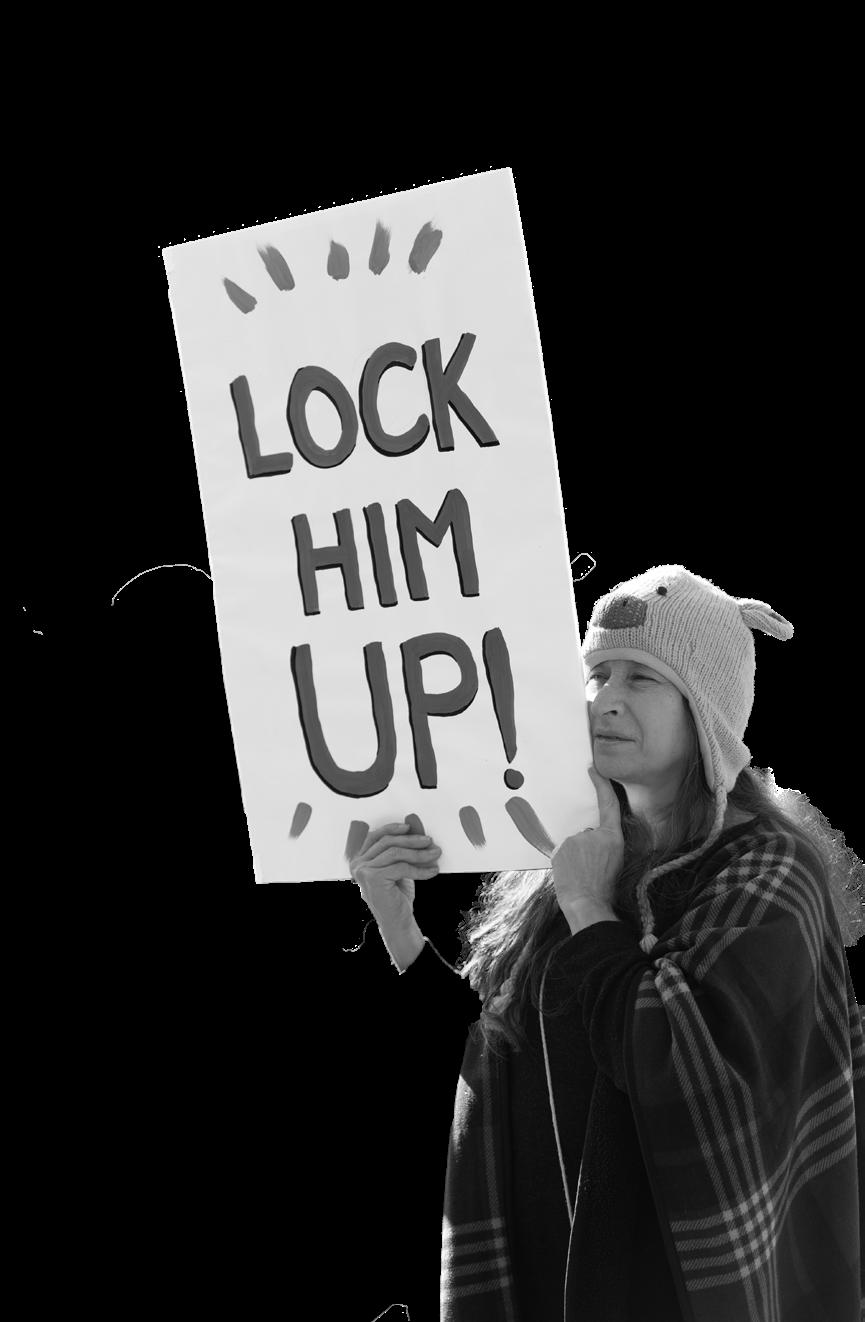





















April 2025 Volume 7 Issue 3
The ultimate goal of Anthro Magazine, Paly’s social activism publication, is to create a platform and forum for students to express their opinions and voices. Social activism is bringing issues into the spotlight to spread awareness and create change in society. On this platform, we will promote unity, diversity, and respect. As a publication, we aim to be inclusive but do not tolerate hate speech of the targeting of individuals. We hope to highlight issues that we see in our community, create a safe place to discuss these issues, and to make sure student voices are heard.
Dear readers,
We are excited to bring you the first edition of Anthro this semester! In the protected bubble of Silicon Valley, it may be hard to feel the impacts of the changes that the Trump administration has made in the past three months. But these effects, no matter how small, are felt by many people in our community and permeate the rest of the country. This edition presents multiple stories highlighting these impacts and the community’s reaction.
In “An uncertain future,” reporters Hadrien de Martel and Jeshurun Wang spotlight the fear that immigrants face in light of the numerous ICE deportations happening around the Bay Area and country. Writers Motoko Iwata and Xander Yap tell the story of a Bay Area student chess player’s experience being revoked from a chess tournament in Florida due to anti-LGBTQ+ laws. In “Healthcare crisis,” Gus Soedarmono and Hadrien de Martel delve into the problematic healthcare system in light of the recent shooting of United Healthcare CEO. Our features section closes off with stories of how activism is playing out on a local level, with staff writer Amily Zhang’s photo essay of two Bay Area protests and Jeshurun Wang’s profile on social justice related clubs at Paly.
As always, Anthro’s opinion section features a diverse array of student voices. Lara Dumanli and Mihika Sridhar provide perspective on how society can combat the increased normalization of rape culture in “Breaking the silence.” Motoko Iwata provides perspective on her Japanese-American identity and the importance of having cultural spaces. In “The blame game,” writers Marcus Ling and Salem Coyle dive into the dangers of a new executive order, cutting funding which impacts the LGBTQ+ community. Finally, our editorial “A dying dove in the cage” defends our First Amendment rights in light of the recent arrests of several immigrant protesters by ICE agents. We hope you enjoy reading our work!
-Lara Dumanli and Vivian Lin, editors-in-chief
Editors-in-Chief
Lara Su Dumanli
Vivian Lin
Managing Editor
Faizan Kashmiri
Features Editor
Marcus Ling
News Editor
Amily Zhang
Opinion Editor
Hadrien de Martel
Design Editor
Amani Fossati-Moiane
Business Manager
Amily Zhang
Staff writers
Motoko Iwata
Ava Knapp
Augustus Soedarmono
Doreen Hou
Cailey Lilly Quita
Alexander Lawson
Mihika Sridhar
Xander Yap
Karin Blumenfeld
Jeshurun Wang
Salem Coyle
Vivian Tang
Artists
Doreen Hou
Chiara Martin
Anushe Irani
Polina van Hulsen
Adviser
Paul Kandell
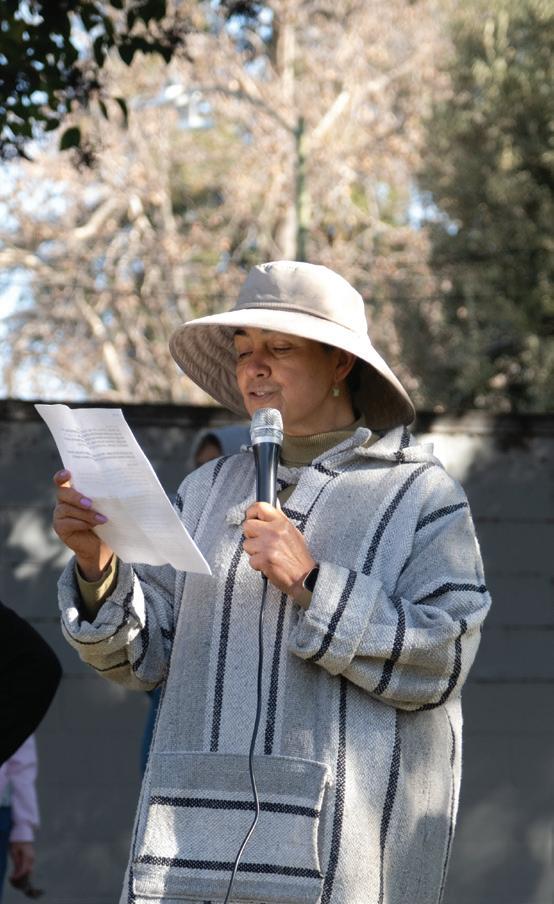
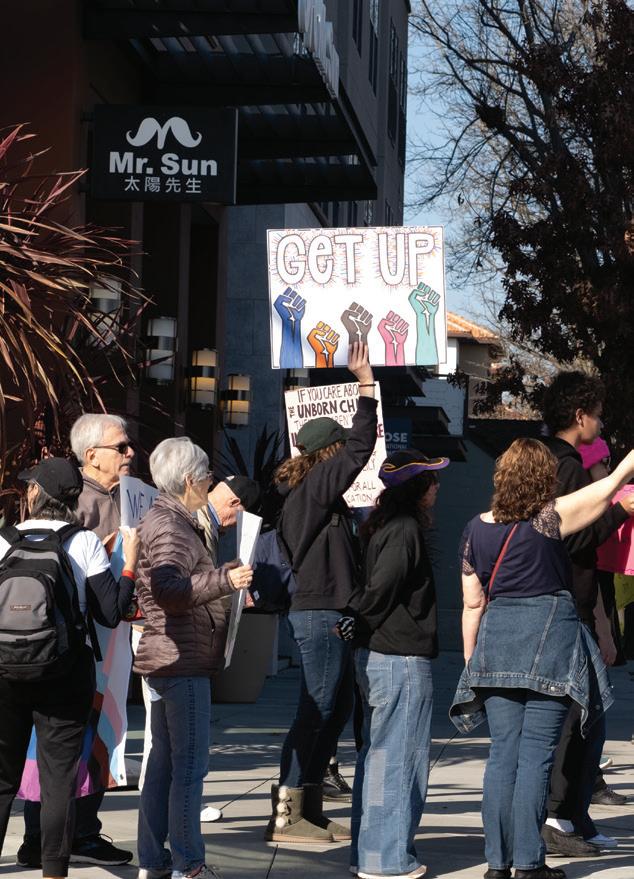
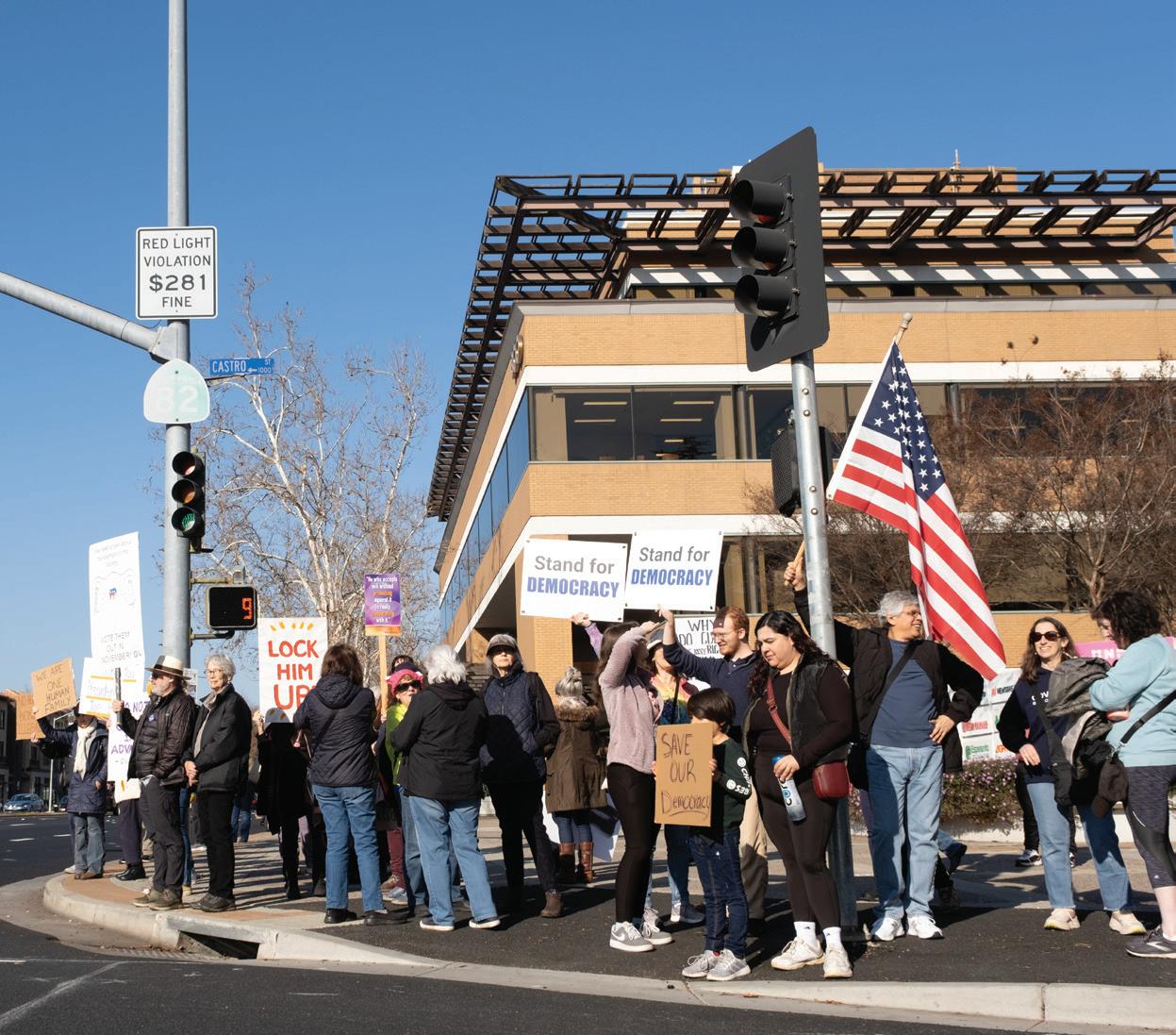
Letters to the Editors
The staff welcomes letters to the editors. We reserve the right to edit all submissions for length, grammar, potential libel, invasion of privacy and obscenity. Send all letters to anthromagazine. paly@gmail.com or to 50 Embarcadero Road, Palo Alto, CA 94301.
Printing & Distribution
Anthro is printed by Folger Graphics in Hayward, California.The Palo Alto Parent Teacher Association mails Anthro to every student’s home. Past issues are available at anthromagazine.org.
Publication Policy
Anthro, a social activism magazine published by students in Palo Alto High School Incubator class, is a designated limited open forum for student expression and discussion of issue of concern to its readership. Anthro is distributed to its readers and the student body at no cost. Please visit anthromagazine.org to view our AI policy and ethics policy.
Editorial
Can you hear the people sing?
Converting Cubberly
Uncertain future
Social Justice, not just a pathway
Embracing the Paly spirit
Healthcare Crisis
Across the board
Trash to Treasure
The Blame Game
Breaking the silence
Cultural spaces
Fight for Freedom
Incubator spotlight
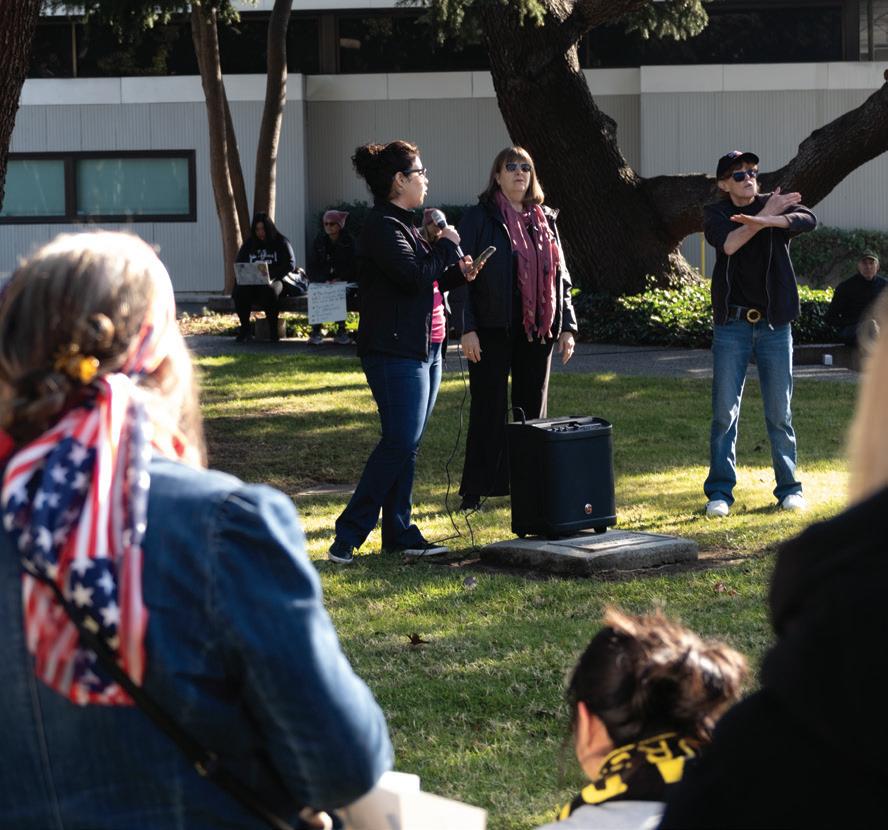
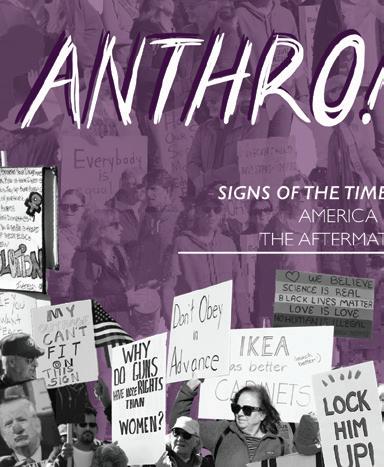
On the cover, News Editor and Business Manager Amily Zhang compiles photos of Bay Area protesters to showcase the reaction of people in light of President Donald Trump coming into office.
Our First Amendment rights are coming under attack.
On the evening of March 8, Columbia University student Mahmoud Khalil was detained by plainclothes officers who said they worked for Immigration and Customs Enforcement, according to an article by Associated Press News.
A day later, Khalil was discovered to have been brought to a detention facility over 1,300 miles away in Louisiana, having not been charged with a crime as stated by New York Civil Liberties Union. According to the New York Times, Khalil has been denied a chance to speak with his lawyer, and has been cut off from the outside world. Khalil, a legal resident of the United States, is now being threatened with deportation.
This doesn’t end at Khalil. When President Donald Trump was elected in November, he promised to crack down on pro-Palestinian students and the “radical left,” whom he argued had infiltrated college campuses, passing Executive Order 14188 (“Additional Measures to Combat Anti-Semitism”) and giving himself the authority to pursue this assault. Wielding ICE as a weapon, Trump has gone on a national offensive targeting Palestinian solidarity orga- nizers and immigrant students
speak up on the Palestinian cause.
Cornell University student Momodou Taa, a Gambian-British citizen who is in the United States on a visa, is also being threatened with deportation for political activity, as reported by the New York Times. ICE recently visited residences to arrest and deport Yunseo Chung, a legal permanent resident and student at Columbia University, who has participated in pro-Palestinian demonstrations.
The deployment of ICE to crack down on the immigrants who dare to speak their mind in protests is a clear violation of their rights. If the government can do this, then what next? The civil liberties of all Americans hangs in the balance.
Democracy fundamentally depends on the protection of civil liberties. The First Amendment grants us the right to speak up and to speak out. It gives us freedom of speech, expression, assembly, religion, and press.
Our position is uncompromising: That any attempt to unjustly crack down on one of America’s most fundamental
People should not be charged, face depor tation or live in fear for exercising their right to free speech.
The targeting of student activists by ICE likely represents the first chapter in a repressive era of American politics. The Trump administration’s attempt to censor activist speech doesn’t stop there – it is real and rampant, spreading to all of us.
For example, Trump has threatened to withhold funding to institutions that he argues uses Diversity, Equity, and Inclusion (DEI) statements. According to the Foundation for Individual Rights and Expression, a national civil rights organization, the Supreme Court has ruled in the past that the government cannot weaponize defunding as a way to force programs to bend to a specific ideological belief, and that it violates the First Amendment.

The press, too, has come under assault. The dispute over the Associated Press’s refusal to use Trump’s touted “Gulf of America” led to their expulsion from the White House Newsroom. Not only that, but Trump himself has declared a new policy of personally picking reporters who can cover Trump from the Whitehouse, according to the new administration policy.
al Trump administration increases its threats towards free speech, it is not our time to be silent – it’s our time to speak up and act.
It is also critical that state govern ments, local governments, publications and schools protect their communities. The Supreme Court ruled in 1969 that students do not “shed their constitutional rights to freedom of speech or expression at the schoolhouse gate.” Additionally, California Education Code 48907 pro tects the freedom of the student press. These protections should be defended and expanded.
We also encourage students to know and exercise these rights when the pres sure to comply with authority is high. Compliance to the administration’s new directives, unconditionally, will lead to further reprisals against unpopular speech down the line. Whether it means getting involved in existing civil rights or ganizations or simply refusing to self-cen sor, all students have a duty to fight for their rights.
Our country may be divided on a range of sociopolitical issues. But the right to free speech – a cornerstone of what allows us to write this in the first place – that is something we must unite together to protect.


Art by CHIARA MARTIN



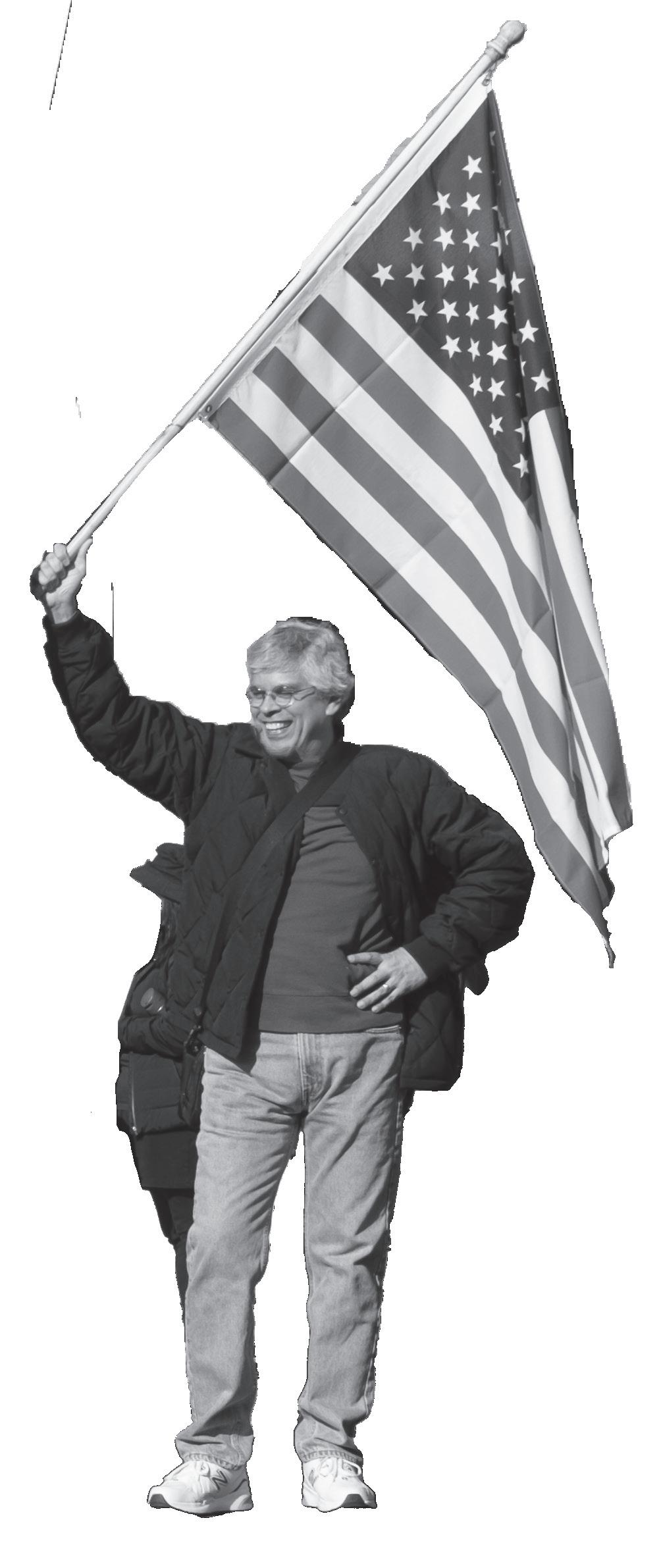



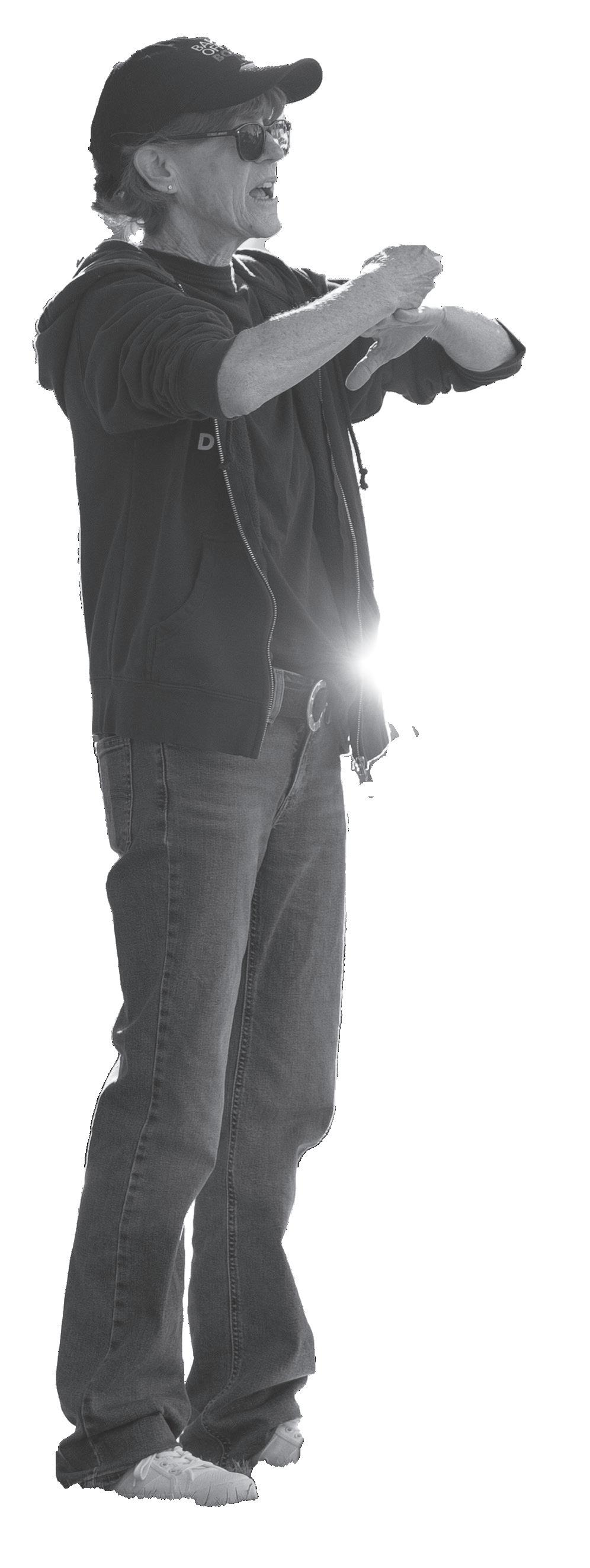



The election of President Donald Trump and the involvement of Tesla CEO Elon Musk in the government has sparked widespread concerns over civil rights. In response, numerous protests have taken place in the past two months. Anthro has covered two major protests: the People’s March in Mountain View in January and the ongoing Tesla Takedown protests.

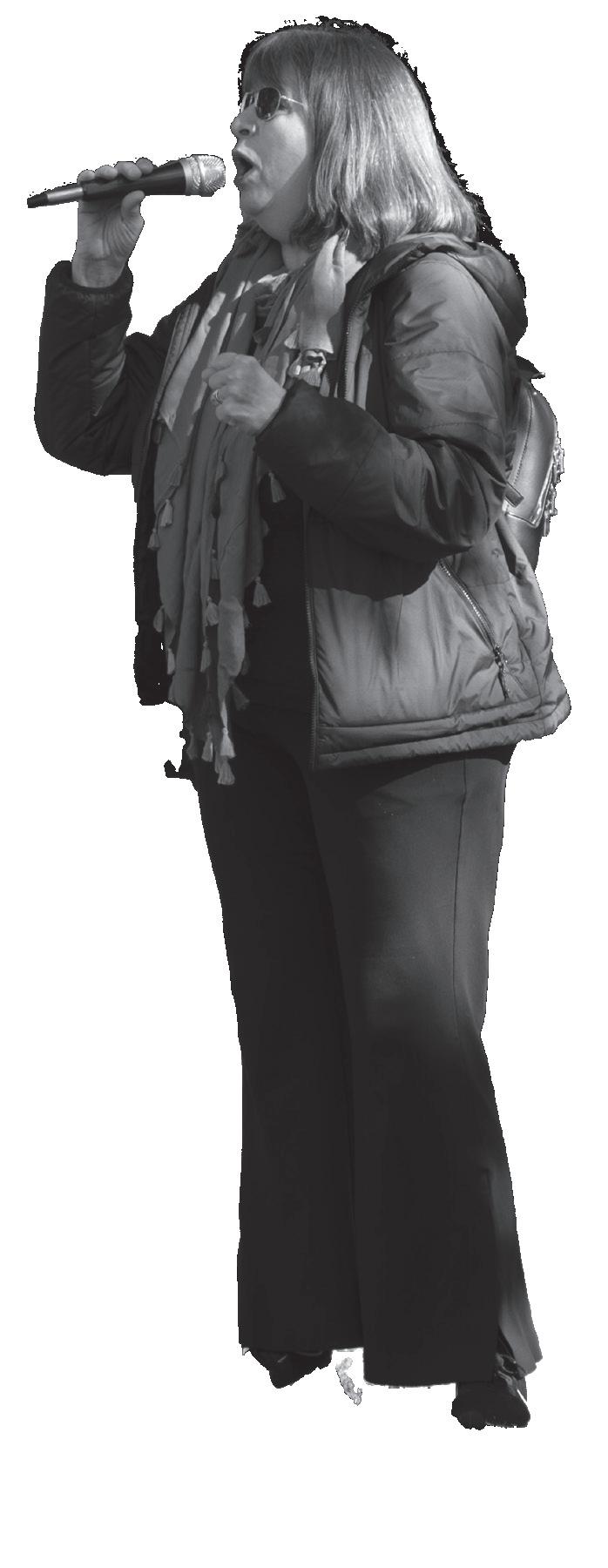
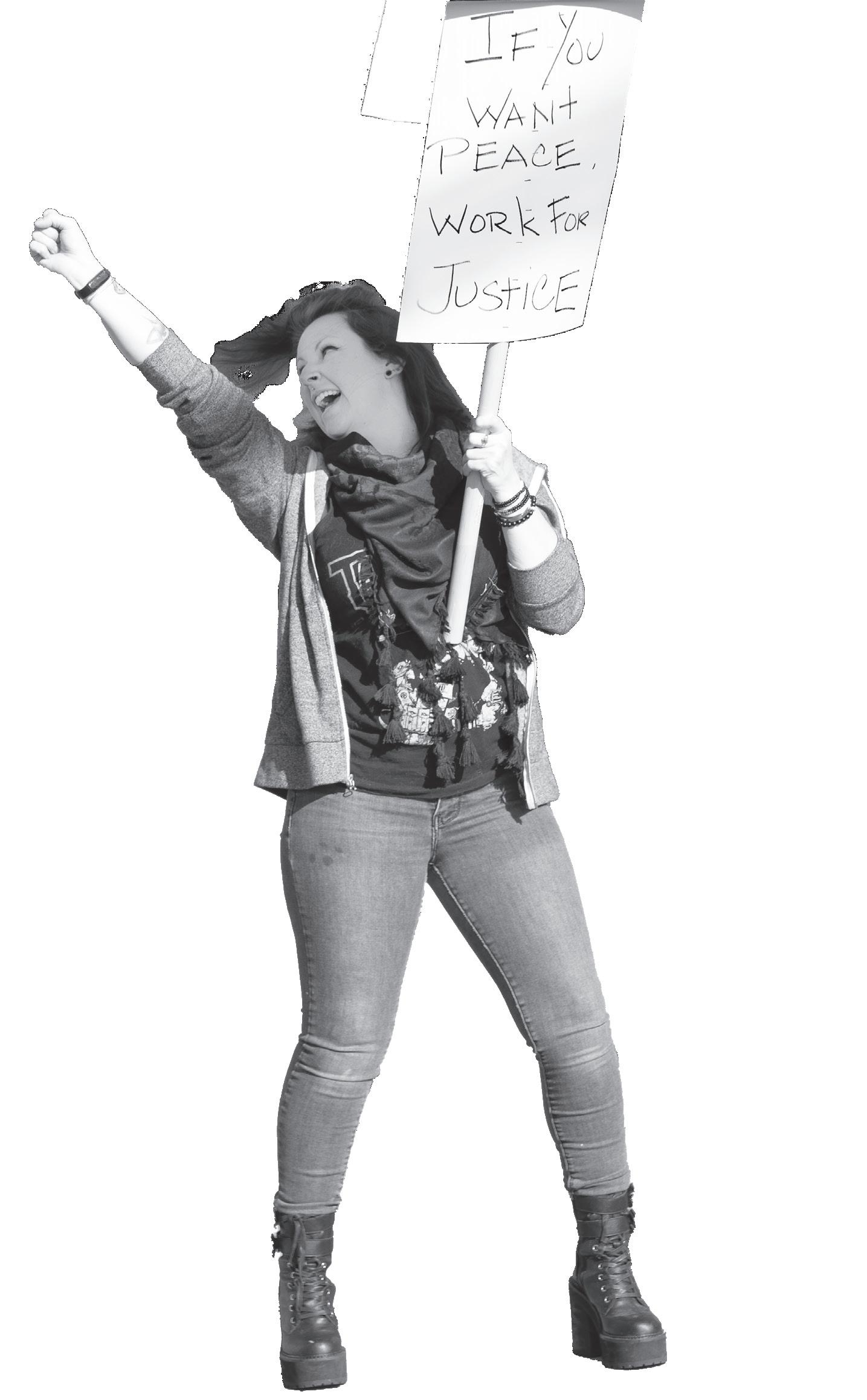


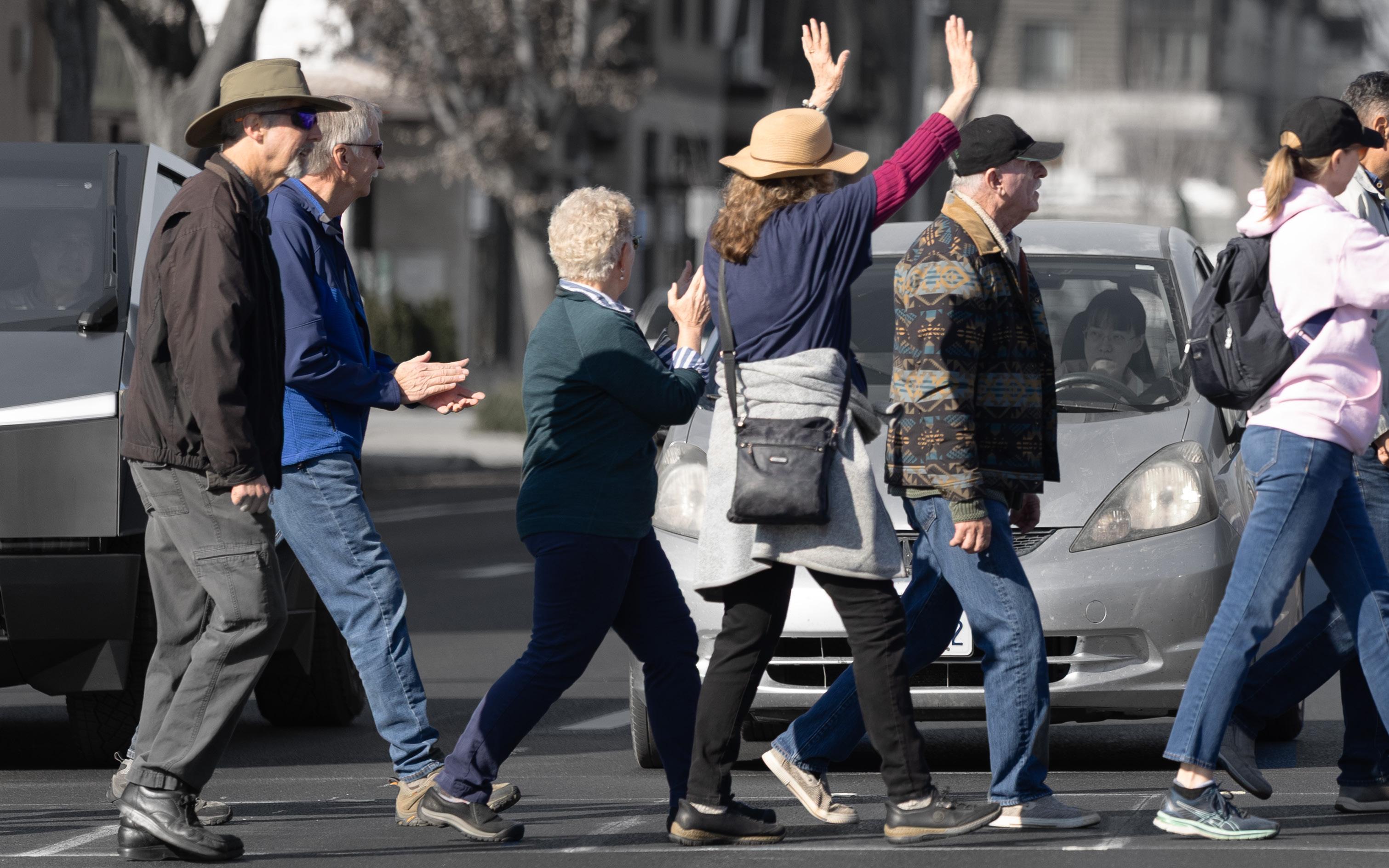

‘Together We Will’ hosted a protest advocating for people’s rights in Mountain View at Gateway Park days before President Trump’s inauguration. The organization has been active for over eight years with a network of 3000 activists. According to the organizer of the event, Ida Rose, they collaborated with the People’s March association and convinced people to participate for two reasons.
“It’s two things,” Rose said. “It’s showing solidarity and being in community at a time where a lot of people are hurting or frightened or unsure what’s going to happen next. It’s to show each other that we aren’t far from each other. But it’s also to let people know that we are here, especially for the most vulnerable people in our communities. We are here by force and in numbers to protect ourselves and each other.”
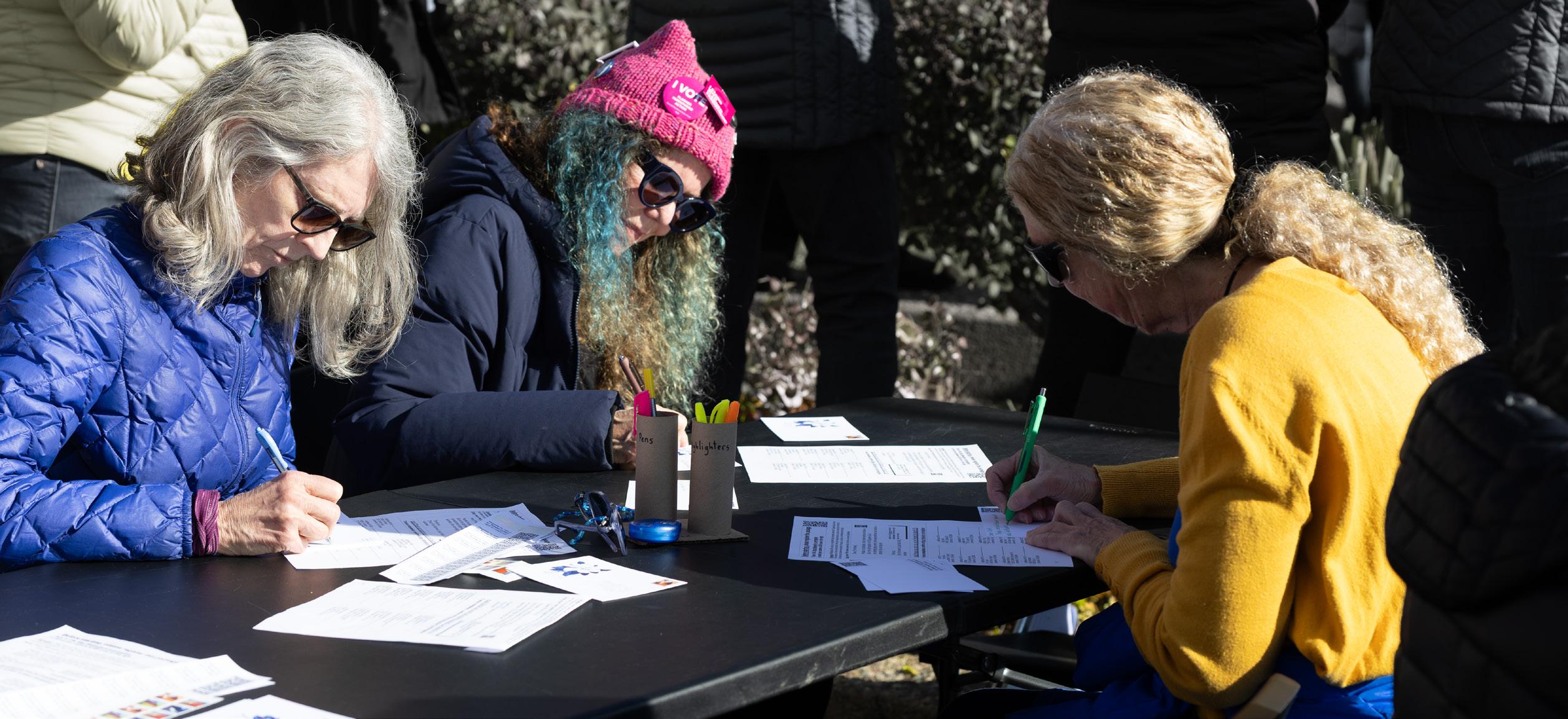
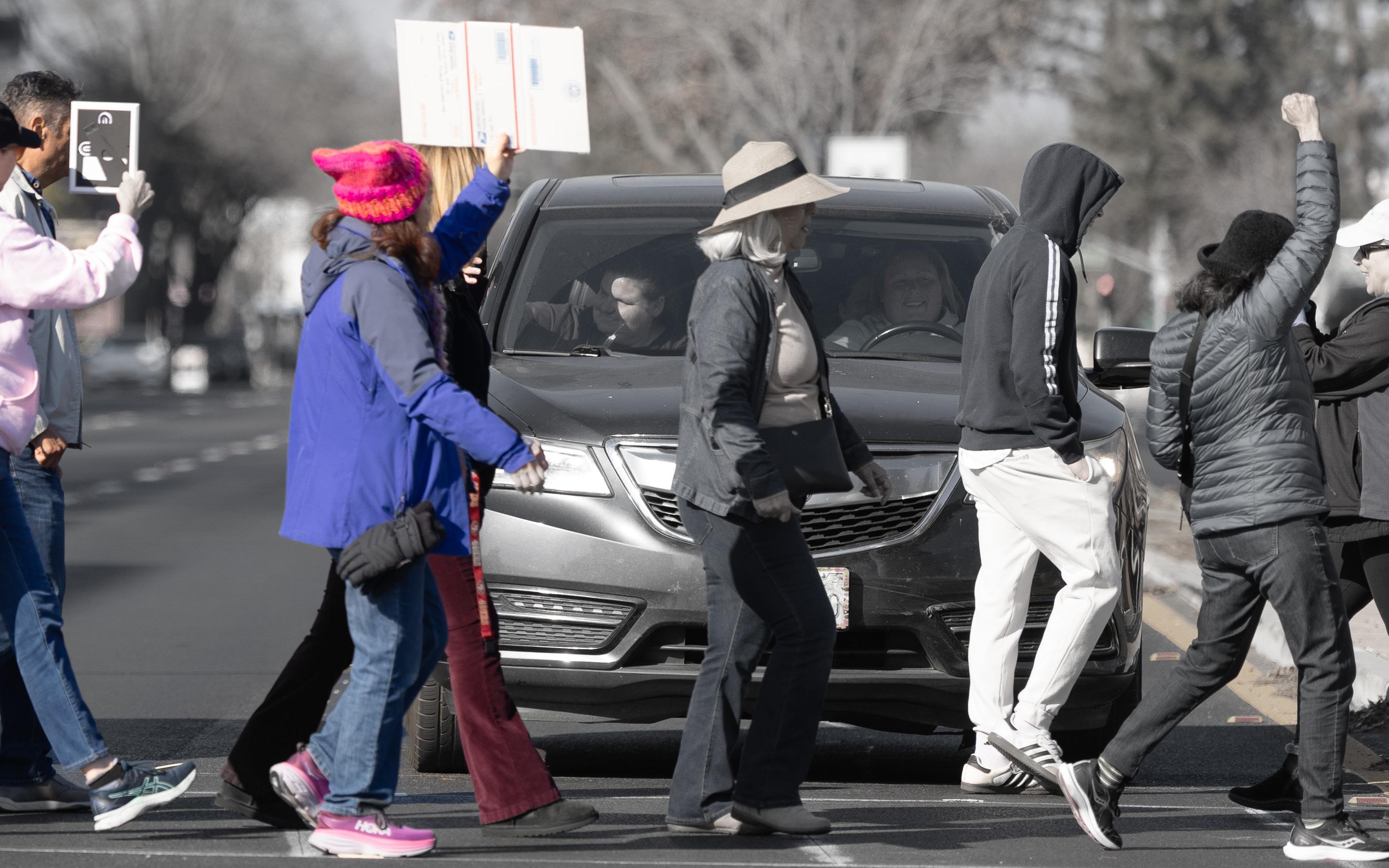
Crossing into Action: (above)
Protesters marched around and across the street encouraging cars to honk their horns in support. Protestor Natalie Crowder held a sign stating ‘Healthcare not Wealthcare’. According to Crowder, she wrote the sign partially based on personal experience. “It’s about everything that’s happening with the insurance companies not supporting people and pulling their coverage when they actually need help,” Crowder said. “People with cancer, they’re not being covered and not getting the treatment that they need. My mom died from cancer years ago when I was 16, and so healthcare is very important to me as somebody who’s mom had a chronic illness. If people are paying for healthcare they need to get the services that they’re paying for. It’s not fair to the people who are actually in need of these things.”
Postcards with Purpose: (left)
Protestors write postcards at tables in Gateway Park. According to one of the event organizers Andre Iceo, the postcards are getting sent to people in more rural areas. “People are not as interested in state elections as they are in national elections,” Iceo said. “So these ones are specifically for Wisconsin state elections and go out to remind people of the elections. It’s just sending them to convince people to vote.”
Little Hands, Big Message: (right)
Protestor Hayden Haley, barely a toddler, held his mom’s hand while waving a heart sign around to the passing cars. His mom, Emily Wolfe, explains that coming to the protest was an important lesson about social justice. “I just want to show my kids that, at a young age, they should stand up for what they believe in,” Wolfe said, “I told him that we’re coming because we’re gathering together to stand up to a bully.”

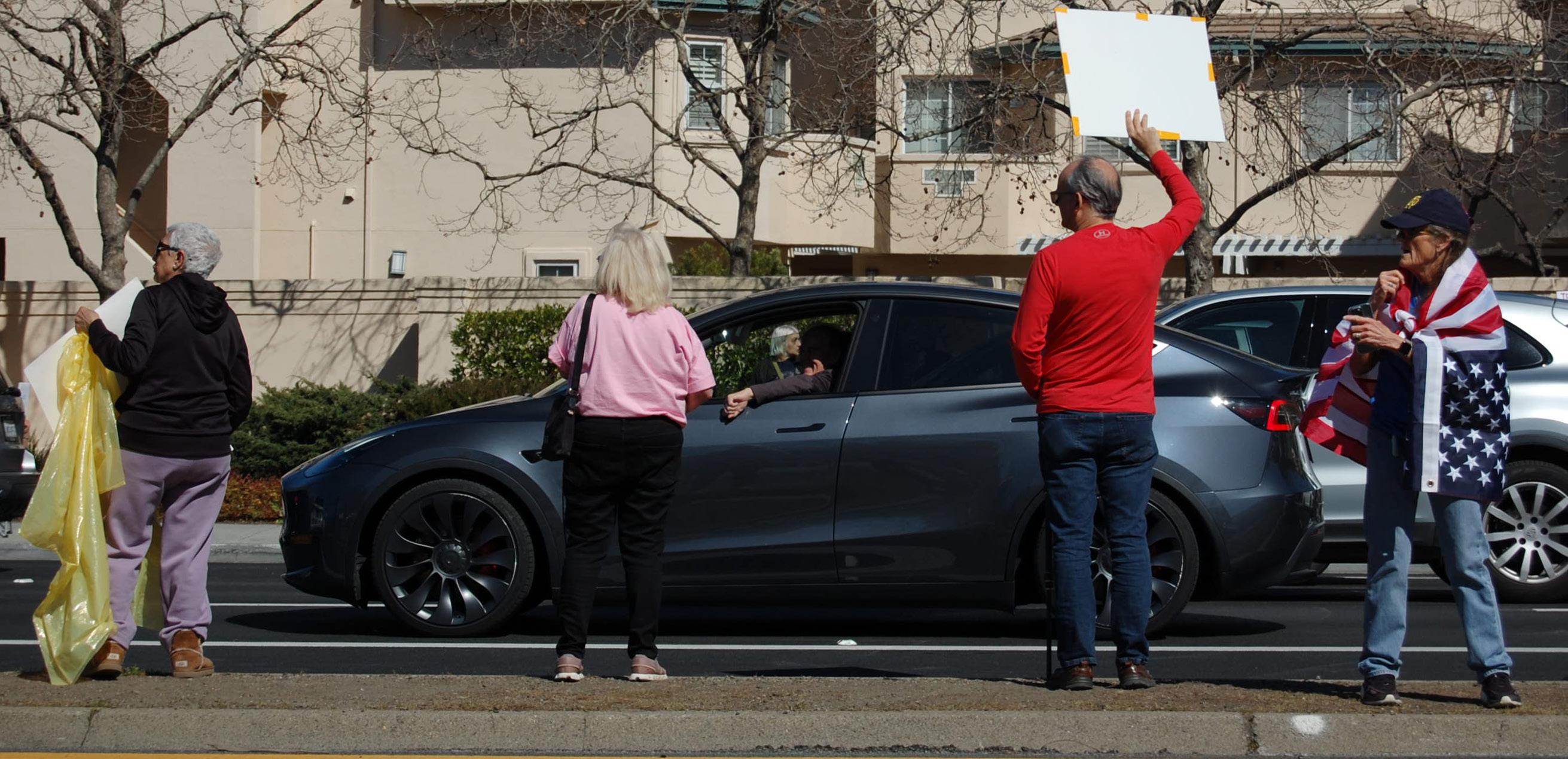
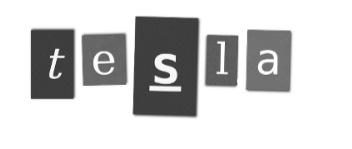


On March 8, the Palo Alto Tesla dealer parking lot was filled as protesters voiced their concerns about the actions of Tesla CEO Elon Musk and President Donald Trump. The protest was a part of a nationwide movement called “Tesla Takedown” in which protesters aimed to reduce Tesla’s sales and raise awareness about many of Musk’s actions, including his salute at Trump’s inauguration parade, budget cuts by the Department of Government Efficiency (DOGE), and many more.
Curbside Callout: (above)
Protesters line the roadway median outside the Tesla dealership in Palo Alto on Saturday, March 30, as part of the national “Tesla Takedown” movement. Organized by Indivisible Palo Alto Plus, the demonstration targeted Tesla CEO Elon Musk’s ties to Donald Trump and broader concerns about democracy and corporate power.
Protestor Kalid Meky stands in the middle of the road during a red light, waving his sign reading “Don’t buy Tesla” to Teslas. “You can’t wait till they abuse you so long,” Meky said. “You gotta do something now. The issue I care most about is our
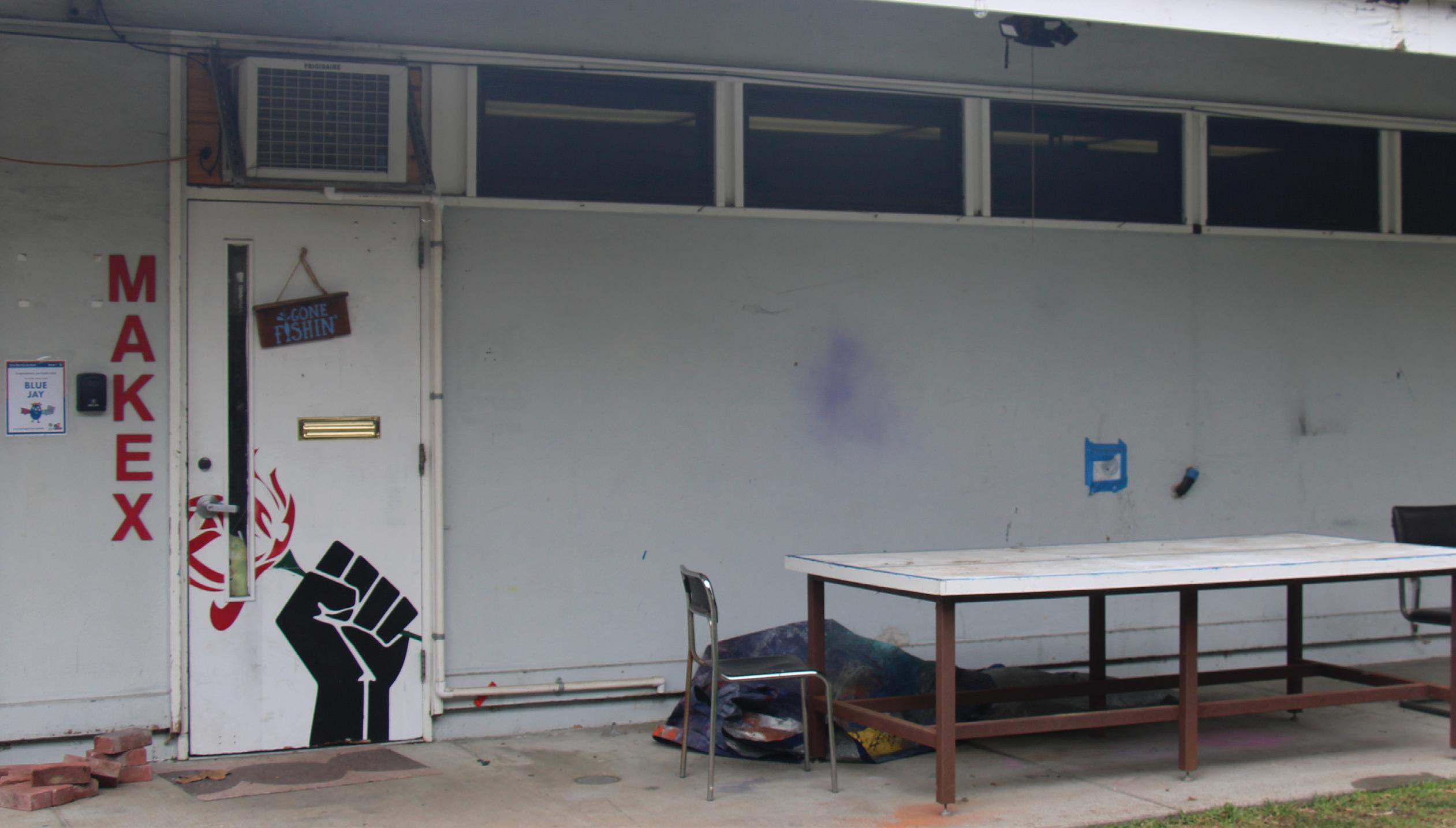
IMMINENT
CHANGES The once-operational classrooms have been turned into spaces for artists and are going to be remodeled.
For nearly 23 years, the building we all love known as Cubberley was one of the three Palo Alto Unified School District high schools. However, in 1979 the school closed due to the district’s need for money.
The former school is now leased by the district and has transformed into a thriving community center. Whether it’s kids learning a new language or sport or artists renting out classrooms for studios, Cubberely attracted many different. Cubbereley opened in 1956 and has changed much since it started welcoming students. It
now houses artists’ studios, sports for kids, and many different programs. However, the degradation of buildings and facilities is prominent.
“I think all of us involved this time around want to be the group that helps bring it over the finish line successfully, but this has been very fraught historically.”
— JULIE LYTHCOTT-HAIMS, Councilwoman
For many years, the city has been trying to purchase the land from the school district to help remodel it, and the city and the school district have finally come to an agreement about selling the 15 acres of land for $65 million.
City Councilwoman Julie Lythcott-Haims said every previous attempt would get further along but would inevitably come across a road bump that simply made it infeasible to keep going with the project.
“There have been all of these attempts to get to this part, but each process has
failed,” Lythcott-Haims said. “I think all of us involved this time around want to be the group that helps bring it over the finish line successfully, but this has been very fraught historically.”
The proposal for the bonds to fund the project will be up for vote in 2026, according to Lythcott-Haims. Until then, it is a waiting game for construction to start.
Concordia is the company that is involved in designing the new Cubberley center. Bobbie Hill, a partner at Concordia hopes that this can be a place for programs, for the people in the community, to prosper.
“We know this is something that will live long into the future, so we want to make sure that it accommodates programs that exist now and prepare for what kind of programs could exist in the future,” Hill said. “We want to create a space that’s very
and
CAILEY LILLY QUITA and MIHIKA SRIDHAR
Text by HADRIEN DE MARTEL
Living in a house with five people is hard. Living with 17 people is practically impossible.
This was the harsh reality of a Mexican immigrant


bility, some immigrants are also worried about mass deportations, as well as future immigration policy changes.
Anthro interviewed two immigrant workers at the Day Worker Center in Mountain View, which primarily connects immigrants with employers, about their personal experiences and what to expect in the future.
“It feels kind of like a nightmare to see the kind of community that we have become and to see the priorities that people have.”
Trump has already begun to follow up on his promises by giving more power to Immigration and Customs Enforcement, declaring a national emergency at the Mexican border, and signing an executive order attempting to end birthright citizenship.
SOPHIA, worker at the Mountain View Day Center
Sophia, an immigrant employee at the Day Worker Center who asked that her real name not be used, expressed concern over the priorities of the American people.
“It feels kind of like a nightmare to see the kind of community that we have become and to see the priorities that people have,” Sophia said.
Her concerns come amid a series of promises Trump has made to deport millions of illegal immigrants.
When asked about the deportations, Sophia labeled them as a “civil and human rights violation.”
New policies along with deportations targeting illegal immigration have created an environment of fear and worry for many immigrants like James, another worker at the Mountain View Day Worker Center.
“I do have to be a little more careful than other people. If I do something that is bad, I get in more trouble than someone that is already living here.”
During Trump’s speech to Congress on March 4, he once again touched on this idea.
“We will eliminate these threats to protect our homeland and complete the largest deportation operation in American history,” Trump said.
— DAVID, Paly student
James, who wishes that his real name not be used, spoke about the effects of Trump’s policies.
“It has been very impactful emotionally, and I’m in a constant state of fear, not confident enough to go shopping because I am scared that something can happen to me,” James said.
Increases in deportation and arrests have only worsened these fears. According to federal data, in the month of February alone, there have been nearly 23,000
arrests and 18,000 deportations.
Stories about violent ICE encounters have also increased, such as the story of Ulises Pena Lopez, an illegal immigrant in Sunnyvale. He was arrested on Feb. 21 after a violent struggle with ICE officers.
tity, immigrated from Mexico three years ago and has been subjected to jokes about his country of origin.
“I feel very vulnerable with all the attacks,”
— JAMES,worker at the Mountain View Day Center
“The brutality of the arrest caused him to collapse and struggle to breathe, resulting in him being rushed to the hospital,” Ulises’ family said in a statement on Instagram.
Incidents like this worry many immigrants.
“I feel very vulnerable with all the attacks […] all the threats and all the things that are happening around,” James said. “It’s hard for me to imagine that something good will happen in the next four years.”
Many student immigrants have also been subject to smaller attacks in the form of jokes. David, a Palo Alto High School student who asked that his real name not be used to protect his iden -
“People joke around with me about being like a border hopper,” David said.
His family, fearing future policies Trump may implement, decided to return to Mexico after Trump was elected to renew their visas and apply for a green card.
“We applied for the green card, and we renewed our visa so that if anything that Donald Trump does, any immigration policies that could happen, we would be ready for them,” David said.
David has also had to be extra careful lately due to the looming threat of deportation.
“I do have to be a little more careful than other people,” David said. “If I do something that is bad, I get in more trouble than some -
one that is already living here.”
When asked how best to protect immigrants, Sophia and James both emphasized speaking up and gathering to fight against unjust policies or laws.
“We can speak to the powerful very loudly, and our voices are going to be heard,” Sophia said. “We have to follow more of the moral law and not those that humans make.”
“I think that we should all come together so that we can be stronger together,” James said.

nthro is interested in looking into new clubs at Palo Alto High School that educate and advocate for social issues. Although Social Justice Pathway is available at school, clubs offer even more opportunities to get involved.
The Accessibility and Inclusion Society of Palo Alto club aims to bring more accessibility and inclusion to Paly by improving our environment for people with disabilities, petitioning for accessibility around campus. The club meets every Monday during lunch in Room 807.
Seniors Kira Loginova and Catherine Funtu serve as the club president and vice-president, respectively. AISPA has advocated for accessibility for students with disabilities around campus. One of these campaigns was for campus elevator permits to be updated.
“We had a campaign for the elevators to have their permits replaced because they were three years out of date,” Loginova said.
By renewing the elevators’ contracts, AISPA increased inclusion within our school environment by making movement around campus easier and more accessible for those with disabilities.
Loginova’s motivation to start the club was due to her disability, which she
did not disclose to Anthro. This inspired her to start AISPA as a way to advocate for better accessibility around campus for people like her.
“I found that a lot of things were no longer as accessible to me, and Paly didn’t seem as inviting anymore, so I wanted to make that change,” Loginova said. “I wanted to do something for the community that would help others like me as well.”
Currently, the club is trying to advocate for improvements to the cell phone policy in the Wellness Center, where students are not allowed to have their phones with them.
“Now we are working on getting some improvements made to the Wellness Center, specifically to the phone rule,” Loginova said.
PETITION MEETING. Outside of classroom 807, the Accessibility and Inclusion Society of Palo Alto club meets during lunch for its weekly meeting on Tuesday. The club discussed plans to petition a repeal of the no-phone policy in wellness at the next PAUSD board meeting.
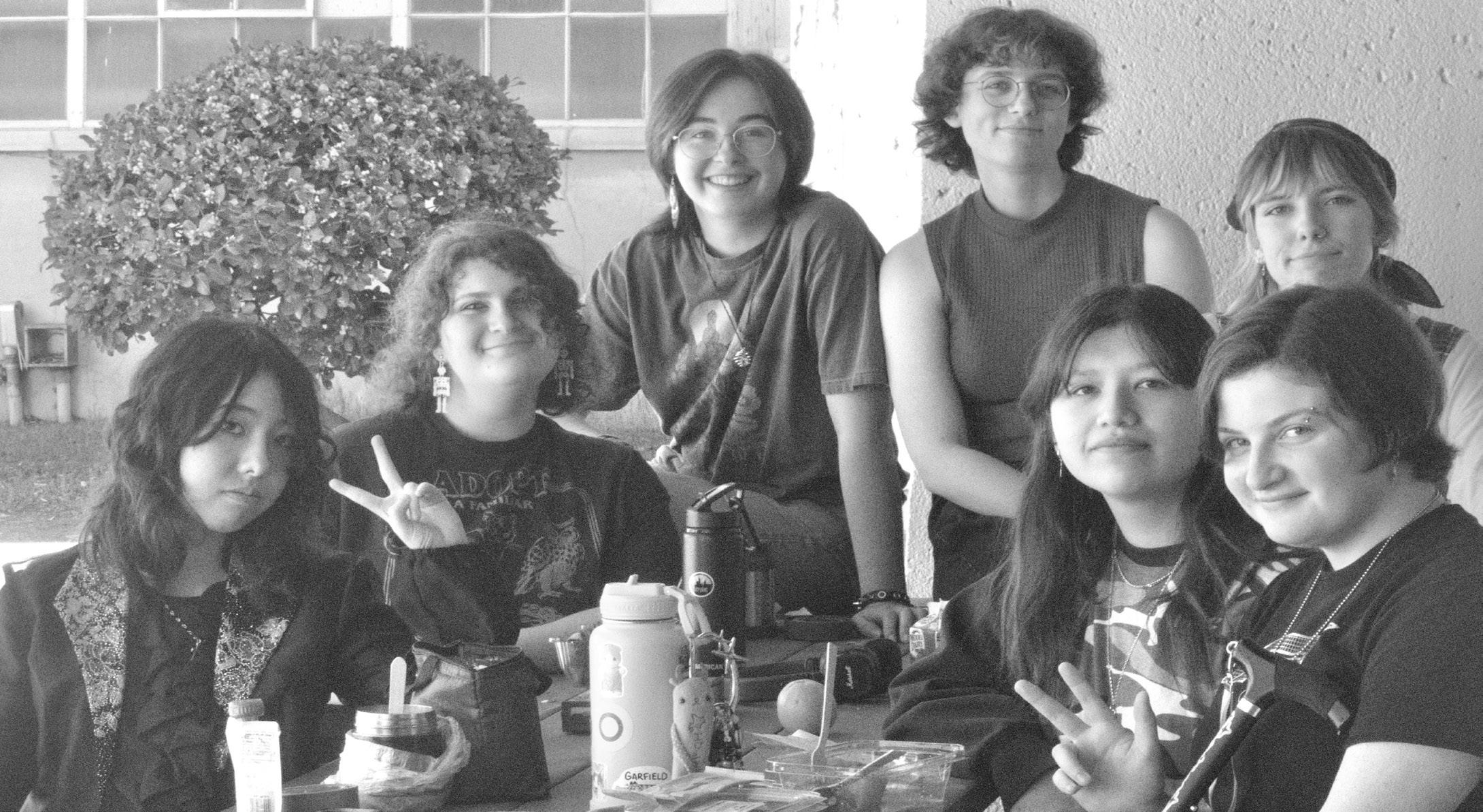
The Criminal Justice Club, led by sophomores Akansha Chatterjee and Jessie Kwan, meets every Thursday during lunch in Room 810. They look at legal cases in the history of the United States, ranging from the Watergate scandal to the Central Park Five case.
“I think a lot of information about the legal system is very secretive, and it’s not common knowledge,” Chatterjee said.
The club strives to educate its club members to be more educated on the legal climate in the United States, looking at important cases throughout history and studying them to gain a deeper and better understanding.
“I think the main thing about my club is to educate, and there are a lot of key trials that we have heard about, but I know that a lot of people don’t actually dive deep and try to discover facts,” Chatterjee said.
What makes the Criminal Justice Club truly stand out from the rest is that it takes time to comb through each issue in meetings and educate others on topics so that club members will be better equipped to understand legal issues.
“We actually take the time to dive deep into each aspect, like forensics, the legal process, or the hearings of these cases,” Kwan said. “And I think that sort of detail is something that you can’t find in other clubs.”
The club chooses the legal cases it covers by specifcally choosing cases in American history that contribute to major changes in the U.S. legal system, as well as cases that use revolutionary technology that contributes to how far the legal system
The Social Justice Club, led by senior Oliver Chancellor, focuses on addressing social justice issues and meets every other Wednesday in Room 404 during lunch.
Chancellor markets the Social Justice Club as an alternative to the Social Justice Pathway that some Paly students might not have a chance to be a part of.
“I want to give [people] an opportunity to [learn about so-
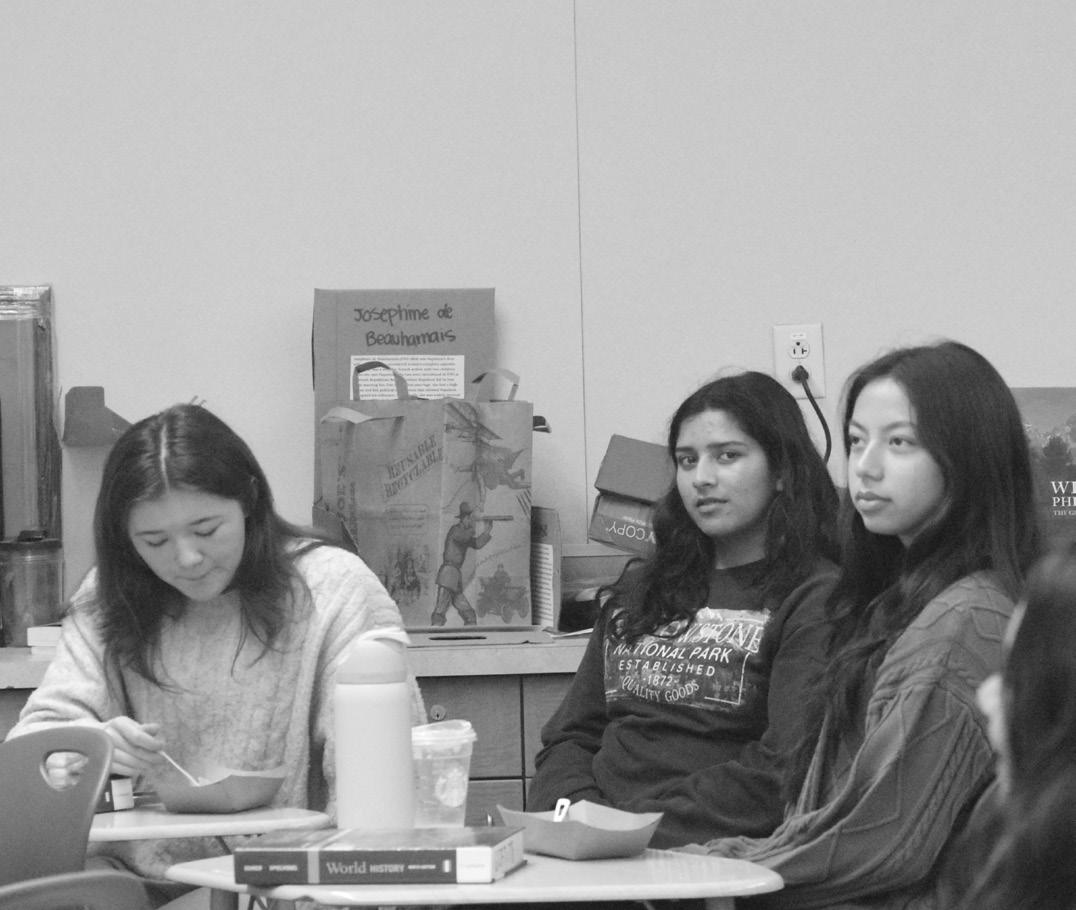
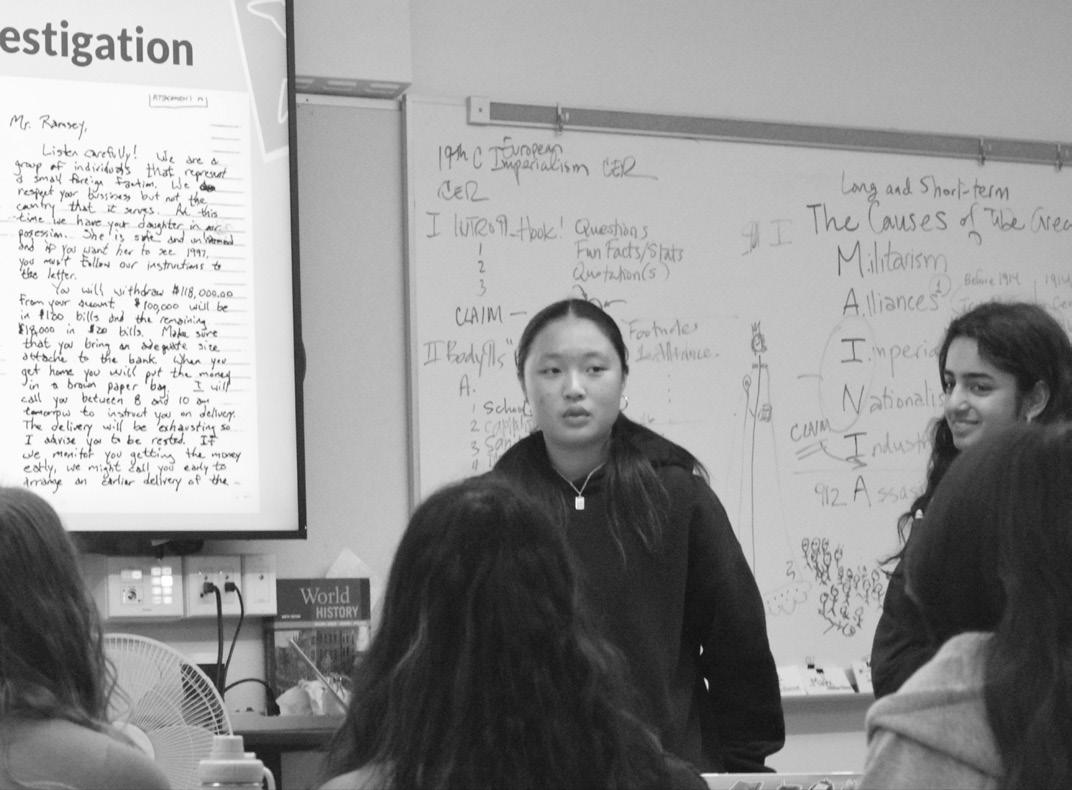
has come in the conviction of crime.
Since this club is relatively new, activities and programs are still in their beginning stages.
“We have some activities planned that we are trying to do in the future, which are either mock trials or asking people from the legal sector to come in and talk to us, but we are still in the planning process of that,” Kwan said.
cial justice] in a little bit more of a fun setting and give them opportunities to speak about topics that they might not have the opportunity to do otherwise,” Chancellor said.
Some specific social issues that are discussed within the club are racism, LGBTQ+ rights, and immigration, as well as current issues such as the recent approval of the Ethnic Studies class by the Palo Alto Unified School Board.
Chancellor tries his best to engage the club with fun activities that bring club members together while providing an open-minded environment where everyone can share their thoughts.
“We try to bring up topics that are relevant right now, or we like to bring up recurring topics in our classes,” Chancellor said. “We are doing an activity called ‘The Line’ where we give a hot take … and we allow [the club members] to have their own opinion on it.”
The club encourages members to not only defend their own opinions but also put themselves in other people’s shoes and learn new ideas from others.
“I think it’s important to not only consider your side and their opinion but also the opinions and views of the opposing side,” Chancellor said.
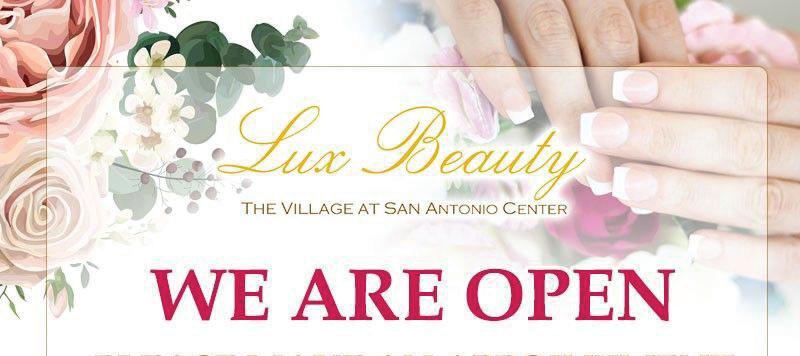
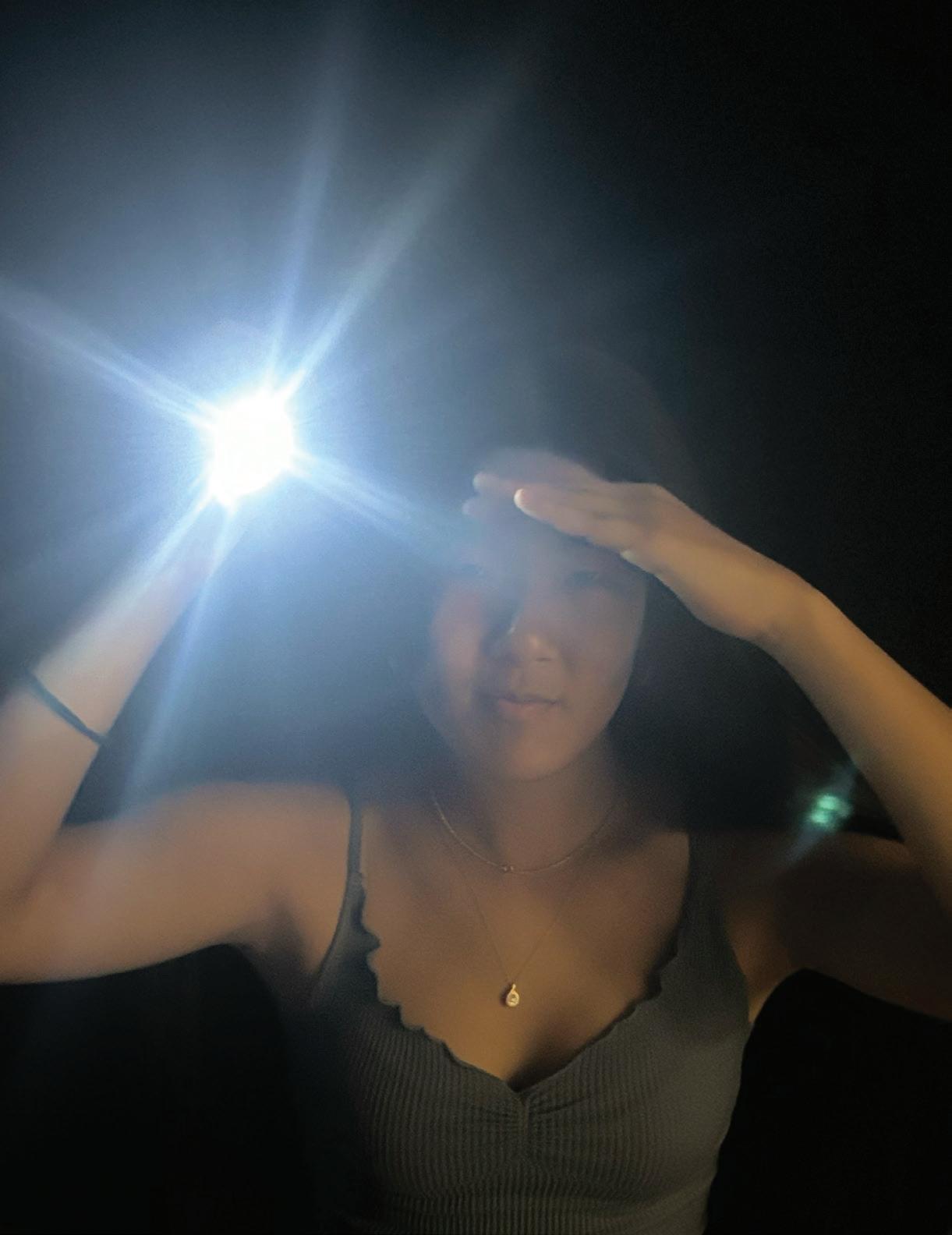



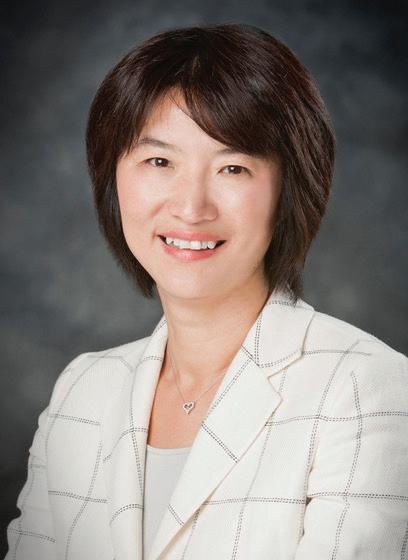

Photo by ANUSHE IRANI
Activism comes in many forms. Sometimes, it’s as small as someone stepping forward to honor somebody and make a difference in their community. This is the case of English and Home Economics teacher Theresa McDermott, who proposed the idea of honoring late Palo Alto High School Campus Supervisor Ernesto Cruz’s values and spirit through the Paly Community Creator Award Scholarship.
For 18 years, Campus Supervisor Ernesto Cruz was a positive presence at Palo Alto High School up until his untimely death in 2022. McDermott said she remembers Cruz as someone made Paly a better place for everyone through his warm presence and attitude.
“To me, Ernesto Cruz embodied all that is wonderful and honorable about Paly,” McDermott said. “He honored the promise that is inherent in all of our students. Whenever I saw him, he had a smile, a warm greeting, and an earnestness to be of service and make the campus a better place for everyone.”
said Cruz’s inclusive and generous personality enhanced the sense of community at Paly because of the relationships he built with kids and staff members. His small but daily acts of kindness inspired the creation of the Paly Community Creator Award. Teachers can nominate students who embody his spirit for the scholarship.
“I hope that our community continues to grow as a kind, inclusive, joyful place where we are happy to come together to question, learn and grow.”
“He knew a ton of kids of all walks of life, and also staff,” Cernobori said. “ And it’s not only the kindness and the generosity, but this idea that he’s always saying hello and including people. So, we called it the Community Creator [Award], and it recognizes a positive student with a positive attitude who regularly demonstrates the community creating spirit, and encourages it to continue.”
— THERESA MCDERMOTT, English and Home Economics teacher
“That first year, I had reached out to our school psychologist because there’s a board policy against memorialization,” Cernobori said. “We mentioned it to Mr. Kline [Principal Brent Kline], and it met the board policy — the idea to have an award that embodies his [Cruz’s] spirit. It took another whole year, and then we figured out exactly what we would call it and the criteria. Now there are a series of scholarships and awards. Some have money, some don’t.”
McDermott said that she hopes the scholarship will encourage students to continue fostering an inclusive environment where everyone can come together and grow.
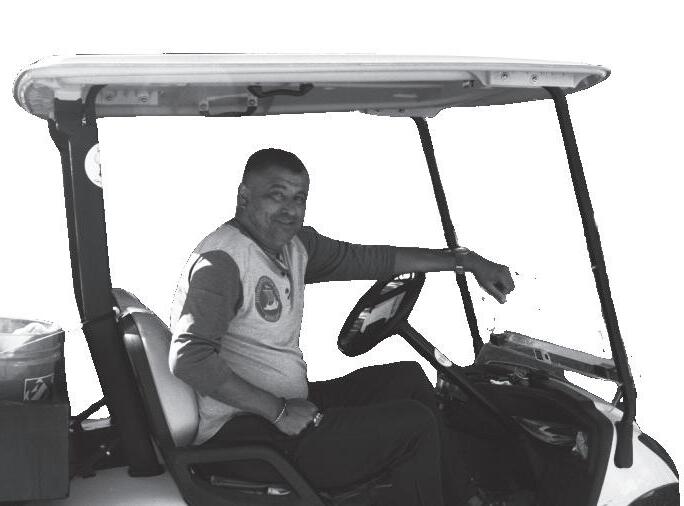
“I always found myself inspired by his joy, gratitude, kindness, and ability to always see the best in others,” Mcdermott said. “I hope that our community continues to grow as a kind, inclusive, joyful place where we are happy to come together to question, learn and grow.”
Cernobori said that recognizing students with Cruz’ attributes, encourages other students to be positive members in their community.
“The part that’s kind of cool is that I think people in the audience [during the award ceremony], whether it’s staff or family members, may not know Ernesto … But the fact that we’re recognizing people for these [Cruz’s] attributes also inspires people to have them, right?”
When UnitedHealthcare CEO Brian Thompson was found dead in early December, shell casings with the words — “deny,” “defend,” and “depose” — were found near the crime scene according to the Associated Press. Five days later, on Dec. 9, 2024, a suspect was apprehended. His name: Luigi Mangione.
Mangione’s alleged actions come during a period of tension between the healthcare system and the

people. According to a Gallup poll conducted a few months ago, only 19 percent of Americans are satisfied with healthcare costs.
For some, Mangione’s alleged actions were symbolic of the hardships within the healthcare system, and he received abundant support. From look-alike contests in the middle of New York City to fanfiction on “Archive of Our Own” or billboards saying, “Free Luigi Mangione/He’s a Hero” 3,000 miles away in California’s Inland Empire, he
“There’s so many people that have their lives completely ruined due to what these health insurance comapnies are doing,”
— GRAHAM VAUGHAN, Paly junior
has received praise in numerous forms. Others, like Palo Alto High School junior Graham Vaughan, say that Mangione’s alleged actions are not the right way to bring attention to issues in healthcare, despite it being arguably justified.
“I feel like there’s so many people that have had their lives completely ruined due to what these health insurance companies are doing,” Vaughan said. “So [the killing of Brian Thompson] is somewhat justified, but I don’t personally agree that assassinating someone is the right way to draw attention to something like this, but it’s definitely one of the most effective ways.”
Rachel Borovina, a pediatrician at the San Mateo County Public Health Department, points out another consequence of rising tensions with the healthcare system after COVID-19, and Mangione’s alleged actions. Her opinion does not necessarily reflect that of San Mateo County.
“A notable point is there has been a steady increase of threats of violence to all members of the healthcare team staff over the past several years, including in the Bay Area,” Borovina said. “The
front office staff, which have the initial contact with the public, and the emergency room staff are in particularly higher risk areas.”
At the healthcare system, where Borovina works, metal detectors or security with wands were put into place during COVID-19, and since then they have remained due to increasing discontent with the healthcare system and hospitals.
“The strain this family had about the fact that they basically couldn’t afford the risk of vaccinating their child because they weren’t sure they could afford the bill that they would get was heartbreaking,”
This represents part of a greater problem with healthcare costs for middle-class families. According to Borovina, it’s due to the fractured healthcare system.


very well.
— RACHEL BOROVINA,
San Mateo County Public Health Department pediatrician
Although the morality of Mangione’s alleged actions can be argued, there is no doubt that it brought the American healthcare system and its many flaws to the forefront of people’s minds.
According to the Peter G. Peterson Foundation, in 2022, Americans spent an estimated $12,742 per person on healthcare, the highest healthcare costs per capita across similar countries. Borovina saw the consequences of these prices firsthand in a recent encounter she had with a family who couldn’t afford vaccines.
“The strain this family had about the fact that they basically couldn’t afford the risk of vaccinating their child because they weren’t sure they could afford the bill that they would get was heartbreaking,” Borovina said.
Borovina says that this family should never have been put into this situation in the first place.
“They were English-speaking, documented, you name it,” Borovina said. “There’s no reason why this middle-class family should be struggling like this to decide on whether or not they’re going to vaccinate their infants.”
“The lack of a national coordination of healthcare services and funding has led to a fractured system which spends on average more than double in healthcare expenditures per person compared to similar international countries while providing worse health outcomes,” Borovina said.
Baldeep Singh, a clinical professor at Stanford, medical director of the Samaritan House, and medical co-director of the Pacific Free Clinic, also says that the high costs are due to the privatization of healthcare.
“The reason that it’s so expensive in the United States is because we have private health insurance, so that’s Blue Cross and UnitedHealthcare and Health Net, and they take 15 to 20 percent off the top, so they add a huge layer of administrative private costs,” Singh said.
“Stanford [hospital] is doing so well because we have a lot of patients that have money and good insurance,” Singh said. “What doesn’t pay well is Medi-Cal because they [families and workers] don’t have a good job [that] covers their health insurance. They can get Obamacare, but Obamacare does not pay hospitals very much, so most of those hospitals are barely making it.”
As a result, hospitals are struggling to stay afloat with a Kauffman Hall report in 2023 finding that one in five California hospitals are at risk of closing.
Still, Singh believes that the current healthcare situation isn’t all negative. With the addition of the Affordable Care Act and Obamacare, major progress has been made to insure all Americans.
“The uninsured rate has been cut in half,” Singh said. “It went from 20 percent to 10 percent. It’s a huge improvement, probably the biggest improvement in healthcare expansion in a generation.”
As a result, hospitals are struggling to stay afloat with a Kauffman Hall report in 2023 finding that one in five California hospitals are at risk of closing.
For students interested in helping, Lavanya Gupta the president of ClinicConnects, a UC-Berkely student club that distributes health supplies to the homeless, believes that actively searching for volunteering opportunities is the best way students can help.
“Social advocacy, volunteering, is the best way to help,” Gupta said.
This system has also inadvertently affects hospitals themselves. Many low-income communities are unable to afford private healthcare and therefore rely on federal aid programs like Medi-Cal or Obamacare, which don’t fund hospitals
How national antiLGBTQ+ bills are impacting trans youth in the Bay Area
Chess has been a cornerstone of Sam’s life.
Sam, who’s actual name Anthro is witholding to protect their identity, competed at the National High School Chess Championship last year.
“It was great,” Sam said. “We [the team] felt good going in and we ended up doing pretty well in it. We were confident and we really enjoyed the trip.”
But when the 2025 Championship was moved to Florida, Sam hit a chess puzzle they just couldn’t solve.
Florida House Bill sb254 grants courts the “temporary emergency jurisdiction over a child present in this state if the child has been subjected to or is threatened with being subjected to sex-reassignment prescriptions or procedures”. Sam realized that this bill could pose a risk to their safety.
up, let me double check and make sure that I’m allowed to go here’.”
Sam hopes that people will recognize how this trickling change can affect all people.
“More than the chess community — there’s this one quote that I like to live my life by: Injustice anywhere is a threat to justice everywhere,” Sam said. “We’re supposed to be a land where people can be who they are, and preventing people from being who they are is just what this bill is doing.”
Anti-LGBTQ+ legislation is surging across the country. The executive orders issued by the Trump administration include those to exclusively define women and men by biologi cal sexes, ban public educational institu tions from recog nizing transgender people, and banning transgender people from entering the military.
“I would say that my hope for trans young people everywhere though, is to find places where they can be fully themselves where they can express themselves and find care and love and security reflected back to them.”
–YUAN WANG, executive producer for Lavender Phoenix
Sam spoke with lawyers to confirm the grim reality.
“I consulted with a parent’s lawyer and emailed a few legal experts on transgender youth,” Sam said. “All of them said it’s a risk that I shouldn’t take. I am still extremely angry about this, it’s very frustrating.”
Originally, Sam was not too concerned about the bill.
“In 2023, when it first passed, I was outraged but did not think much,” Sam said. “So when I heard about the chess tournament being in Orlando, I said ‘Hold
executive producer for Lavender Phoe nix, a trans-queer organization for Asian and Pacific Is lander people, says that such oppres sion is not new.
“Even before this [presidential] administration, we saw over 1,000 An ti-LGBTQ+ laws being proposed across the 50 states, and many of those were specifically anti-trans bills that were seeking to limit access to healthcare,” Wang said. “This is, from research and lived experience, lifesaving, gender affirming care.”
According to a report from the Trans Legislation Tracker, 42 an ti-trans bills have passed so far in 2025. Currently, there are 821 bills under con sideration across the United States that would impact the transgender community. Sam feels the impact of increasing re
strictions on their identity.
“Currently, I’m avoiding most southern red states, as I am truly afraid,” Sam said. “I just don’t wanna risk it. It’s narrowing down where I look for colleges and it’s narrowing down where I feel safe and where I can travel to.”
In response to movements to suppress trans identity, organizations are providing increased support.
Lavender Phoenix is one of these organizations.
“Our healing justice members are leading ... a free peer counseling program service for transgender API people,” Wang says, “We’ve also been leading community safety and defense workshops for
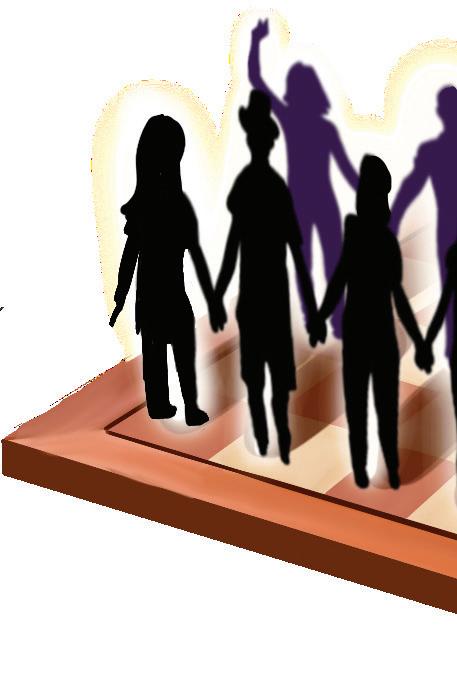
the last few years to help trans folks build the skills to keep each other safe.”
Wang hopes that everyone together can build a space for trans people.
“I would say that my hope for trans young people everywhere though, is to find places where they can be fully themselves,” Wang said, “Where they can express themselves and find care and love and security reflected back to them.”
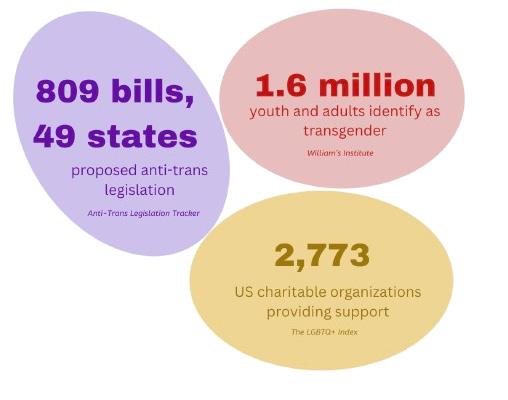
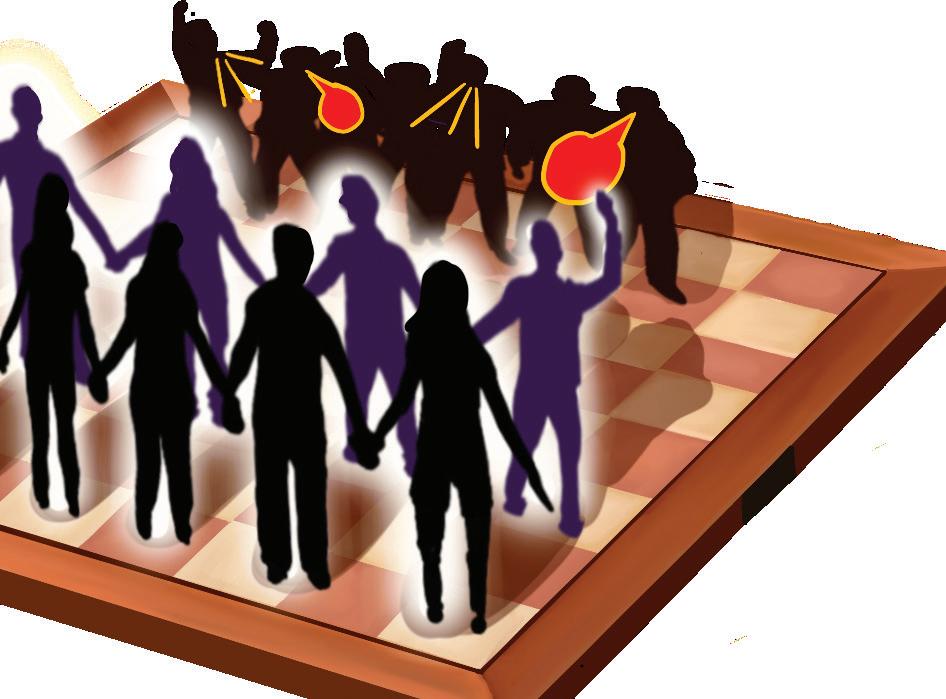
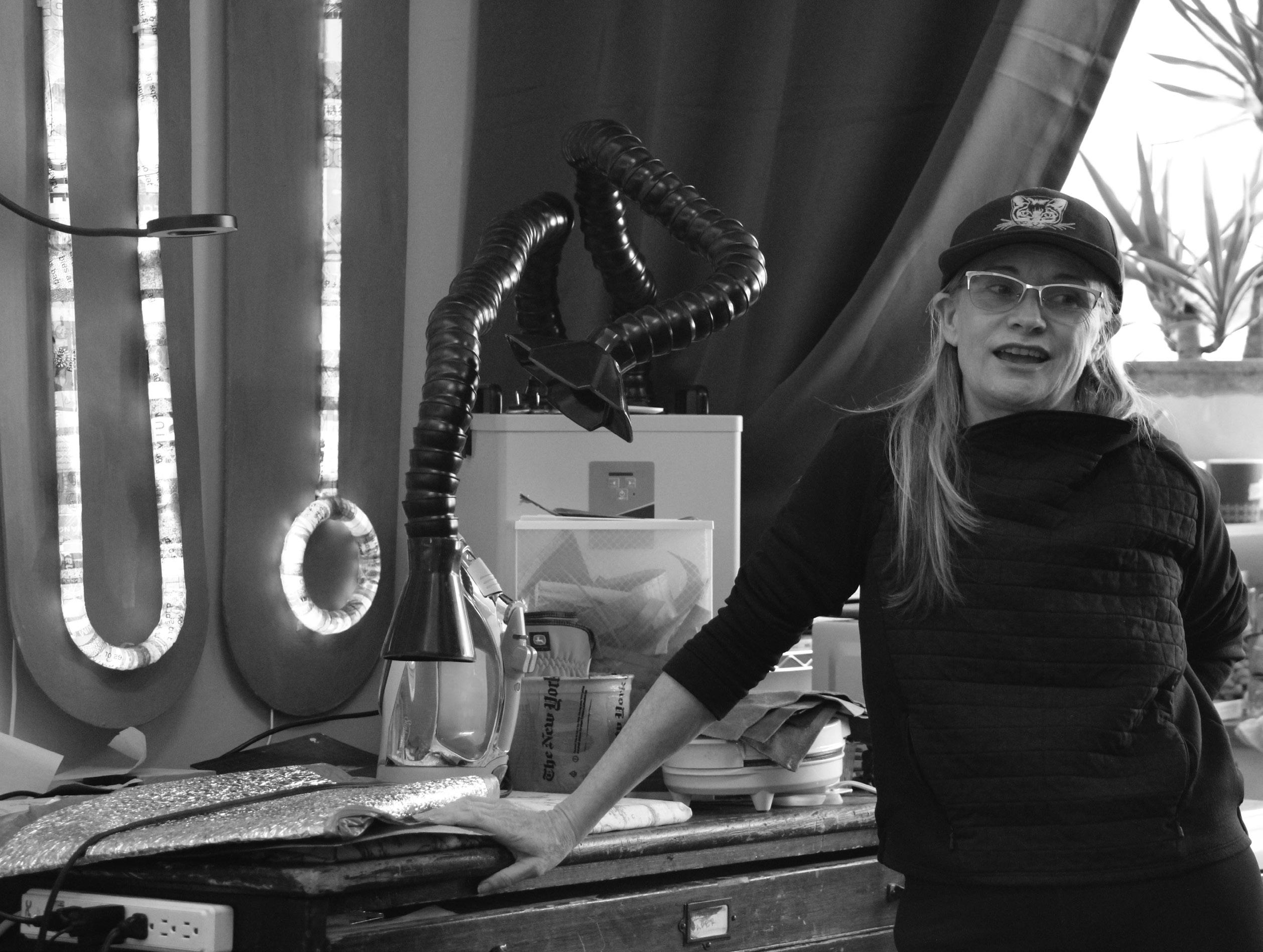
Palo Alto Cubberely Community Center artist shares her repurposing journey
Text
and photos by:
CAILEY LILLY QUITA & MIHIKA SRIDHAR
Abook showcases a photo of a black-white- and brown-feathered decomposing bird with its stomach cut open on the left side of the page. On the ride side, from metal screws to plastic bottle caps, an alarming amount of trash sprawled out inside of the bird.
This photo sparked Tara de la Garza’s interest in protecting the environment through her way, of art. Not your basic trash collages but elegant handbags made from plastic bags and captivating light fixtures filled with discarded waste.
This isn’t what de la Garza originally planned to do with her art. She started as a collagist in New York before moving to California. Then seven years ago, she saw the photo that sparked her new work. A photo of a bird with trash coming out of its stomach in “Archipelago” by Liittschwager and Middleton from National Geographic.
“What was in his stomach was all these
little bits of plastic, and that set something off in me,” de la Garza said. “I was really sad to see that we’re having such a huge impact on such a remote part of the world, so I started to collect my own plastic and make it into the artworks.”
De la Garza is in her seventh year in the Cubberley Artist Studio Program at the Cubberley Community Center in Palo Alto. She works out of one of the former school’s classrooms. Her work has been featured in the Watson Library at the Metropolitan Museum of Art in New York City.
De la Garza founded a non-profit called Inventurous, which focuses on collecting all types of plastics and repurposing them into something new. The non-profit was inspired after Senate Bill 54 was passed. It aims to limit plastic waste by removing plastic bags from supermarkets, and it will be enforced starting in 2026. De la Garza wanted to help her community by doing something with all the plastic waste that can’t be recycled.

“Film plastics aren’t recycled at facilities because the machines that sort the recyclables gets caught and break them,” de la Garza said. “I also collect takeout containers because the robot can’t read the symbols on the bottom, and pill vials because a lot of people don’t recycle those either.”
Inventurous has a handbag line, called Rubbish, made of repurposed plastic newspaper bags. De la Garza turns them into a leather-like material using a heat press. For the bag handles she uses plastic she collects and turns them into chains, or she collects her straps from old bags.
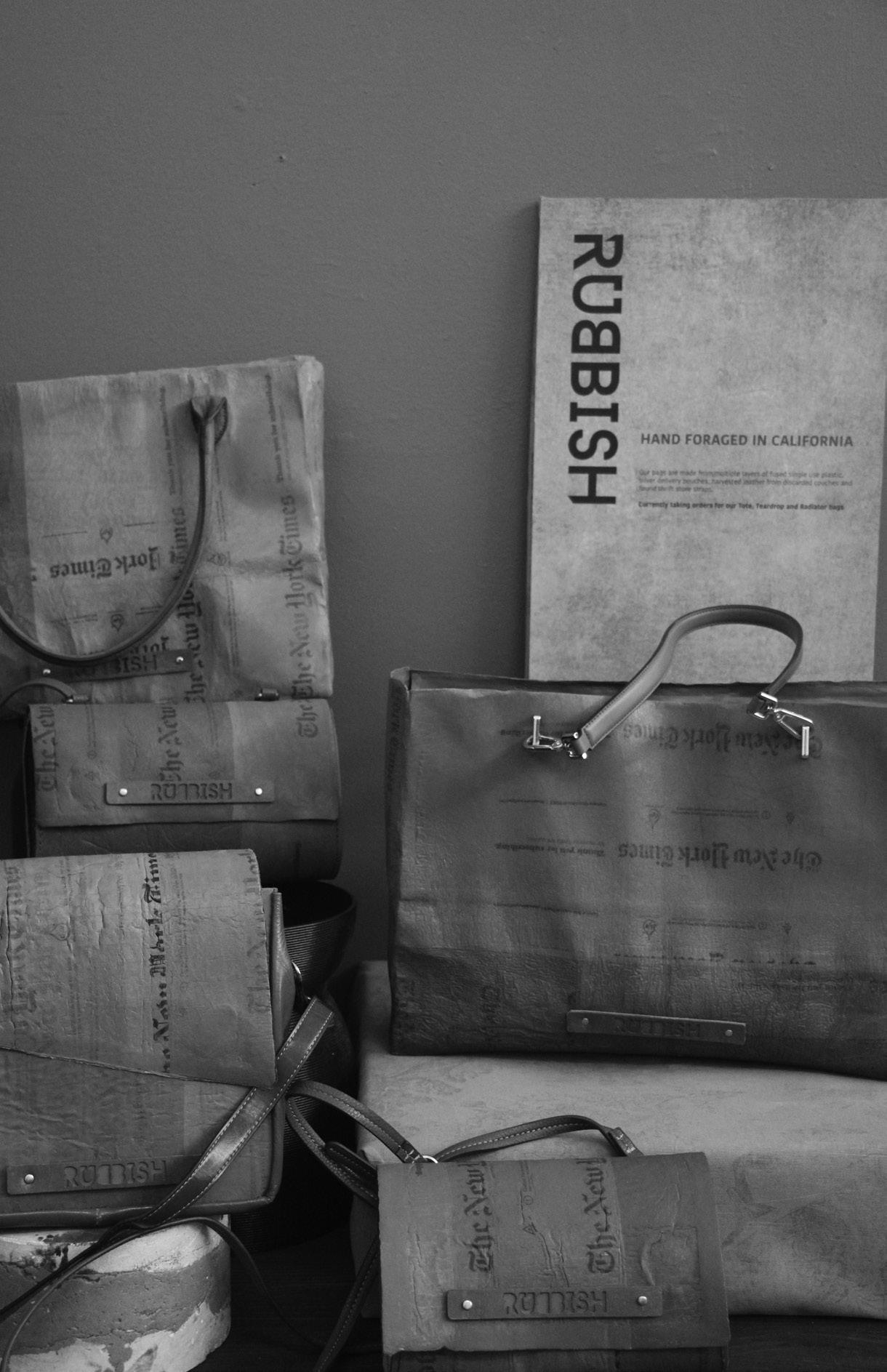
hold bag drops for the handbags they make. The money collected is then returned to the non-profit, which can use it to fund more educational campaigns and fundraisers.
“I was really sad to see that we’re having such a huge impact on such a remote part of the world, so I started to collect my own plastic and make it into the artworks.
–TARA DE LA GARZA , Artist
People in artistic fields have just as much of an impact on our community as people who work in technology. Their works bring happiness to many people and are crucial to the future.
“There's a lot of really creative people in this community,” de la Garza said. “And although Silicon Valley is very tech-focused, I think there needs to be a balance of that, and our future is all about being creative.”
COVERED IN COLOR (LEFT): De La Garza in her studio at Cubberley standing on front of old light tubes that are covered with trash wrappers that all match a specific color scheme.
THE BOOK (TOP LEFT): The photos that sparked de la Garza’s inspiration for recycling trash into useful everyday items. It showcases tiny bits of colorful trash and found inside a petite bird – a horrifying insight into the world we live in.
FROM BAGS TO BAGS (TOP RIGHT): Handcrafted handbags made with straps made by de la Garza and old newspaper bags. They have their own line called, “Rubish,” and is a wonderful way to recycle trash into something anyone can use.
De la Garza and her volunteer staff
T H e B L A M E G A M E


community is always the scapegoat, never the GOAT
On Jan. 27, U.S President Donald Trump ordered a freeze on $3 trillion worth of federal funding and grants, particularly focusing on NGOs, foreign aid, and sustainability development.
A memo from the White House Office of Management and Budget reads that “the use of Federal resources to advance Marxist equity, transgenderism, and green new deal social engineering policies is a waste of taxpayer dollars that does not improve the dayto-day lives of those we serve.”
This executive order epitomizes the shift in LGBTQ politics that the new presidency brings. These increasingly targeted campaigns against LGBTQ individuals create a frightening ripple effect — not only is it an already-vulnerable minority group punched down even further, but these budget cuts simultaneously serve to harm the greater America.
Trump has ignored the fact that federal funding has actually improved the day-to-day lives of members of the LGBTQ community. Previously, the Biden administration, through the CARES Act, provided financial relief to LGBTQ workers, who were overrepresented in industries most heavily impacted by the COVID-19 pandemic, such as warehousing, entertainment, and arts. Also, compared to the general population, LGBTQ citizens have also been surveyed to have lower incomes, higher rates of poverty and unemployment, increased food insecurity, and greater risk of homelessness.
fact that rhetoric against trans people is being weaponized to cut benefits for all.
According to the Association of Clinicians for the Underserved, the funding freeze paused research projects at the National Institutes of Health; defunded many community health centers; disrupted public health programs addressing mental health and substance use disorder; and threatened essential workforce programs like the National Health Service Corps. Essentially, this funding freeze scapegoating “transgenderism” threatens everyone’s healthcare.
Similarly, framing LGBTQ as an ideology rather than a trait has been used as a talking point to target the education system. Trump has said multiple times that “your kid goes to school and comes home a few days later with an operation.” This claim is demonstrably false: what this alleged “crusader against fake news” described has never happened before, and many public schools are already in budget crises, unable to adequately pay their staff, meaning they cannot feasibly open up full-scale medical clinics.
It is time for Bay Area students to stand up for the LGBTQ community.
community being used as part of the enabling rhetoric among Trump supporters.
It’s easy for Bay Area students to watch from our ivory towers. However, California has not always been the bastion of progressive values we hope it is.
Social progress can benefit the entirety of America without the need to put down marginalized communities.
In Los Angeles, a protest against Pride Day turned violent. In Glendale, pro- and anti-LGBTQ protestors broke out in a fight at a school board meeting discussing Pride Month. And most worryingly, senior officials in California Governor Gavin Newsom’s administration advised Democratic lawmakers against proposing transgender rights legislation, according to Politico.
Even in a state as blue as California, the rights of LGBTQ individuals remain a contentious issue. As such, it is time for Bay Area students to stand up for the LGBTQ community.
It is clear that in his pursuit of so-called “government efficiency,” Trump has abandoned the rights of a portion of the most vulnerable members of society. It is not “Marxist” to help out those in need. More worrying about this funding freeze is the
Using this misinformation campaign, Trump is trying to disband the Department of Education, claiming that it has been overtaken by “radicals, zealots, and Marxists.”
On Jan. 29, 2025, Trump issued an executive order that includes a plan to defund K-12 schools that engage in “anti-American ideology,” which includes education based on “gender ideology.” And on Mar. 20, Trump signed an executive order to “begin eliminating the federal Department of Education.”
Public education is a cornerstone of democracy, ensuring that all children, regardless of background, receive the knowledge and skills necessary to participate in civic life. And for someone who has previously claimed to love the poorly educated, Trump seems to have no qualms about attacking the education system. Decades of bipartisan efforts working towards improving education effectiveness and equity are to be erased, with animus toward the LGBTQ
Every time an LGBTQ person is cast as the source of societal dysfunction, trace the rhetorical thread back to its actual origins. Protest to raise awareness. Reveal how institutional failures are the true architects of social strain — not the communities being systematically blamed.
To help accomplish this, we must amplify queer voices by creating platforms where they can articulate their own narratives, where the complexity of lived experience shatters the crude caricatures of political rhetoric. Scapegoating thrives on polarization, on reducing complex human experiences to simplistic oppositional frames.
It’s time to realize that social progress can benefit the entirety of America without the need to put down marginalized communities.



With the glamour, glitz, and fame, Hollywood seems to be everybody’s dream. It has the endless red carpets, conventionally attractive people & the opportunities of a lifetime, but for an industry so deeply rooted in reputations, what happens when those reputations are exposed for something more sinister?
Well, actually, as it turns out, nothing. According to a USA Today survey that asked 843 women working in the entertainment industry, only one in four reported sexual harassment and assault. Only 28% of those who reported the instances said that their workplace environment actually got better.
Celebrities possess an overwhelming amount of power, money, and influence, so oftentimes they can get away with not accepting responsibility for their actions. However, this behavior, as astonishing as it may seem, has become normalized. In a 2023 study, 71% of workers in the entertainment industry believed it is unlikely that a person in power will be held accountable for their actions.
edent that these actions are fine. In the movie Grease, Danny climbs on top of Sandy and kisses her against her will. Grease, however, is still one of the highest-grossing musicals ever released.
Hundreds of miles away from Hollywood, Kennedy Do, president of RISE, Palo Alto High School’s club is fighting this stigma on a local front. Do explains how RISE focuses on creating a responsive school environment around sexual assault and consent education, explains how the club aims to advocate for Title IX awareness and combat any sexual violence that occurs on campus.
Most accusations of rape are true, as, according to FBI only 8% of accusations are false.
In 2017, when the surge of the #METOO movement spread across social media, sprouting heavily from the accusations of Harvey Weinstein, a prominent LA producer. A New York Times article detailing the decades of sexual abuse exposed Weinstein to them, not to Hollywood, though— they already knew, but to the rest of the world, it ignited a global conversation on accountability.
In a world where this culture has been so established that its very reputation is joked about at award shows. During Ricky Gervais’s speech at Golden Globes, his roast featured a direct call out to everybody who continued to work for Weinstein, even after the allegations.
“Our next presenter starred in Netflix’s Birdbox, a movie where people survived by acting like they don’t see a thing. Sort of like working for Harvey Weinstein. You did it, I didn’t do it, you did it,” Gervais said.
What is shown in Hollywood often reflects back to what students think is okay. Sexual misconduct in movies is so common yet it is often brushed off, setting a prec-
when women began baselessly accusing him of lies in desperate pursuit of hurting his campaign or money and fame,” Trump campaign national press secretary Karoline Leavitt said.
When people automatically assume that the woman is lying, we project that onto every sexual violence case in America.
We cannot let women continue to suffer in silence. We cannot let someone’s fame override their responsibility. Hollywood needs to take the first step in holding celebrities accountable for their actions.
Nobody is saying all these women are right, but when the majority do face these acts of violence, why, as a society, still support the man first?
“In the Hollywood industry, with movies and TV shows, they often romanticize coercion and overlook sexual misconduct,” Do said. “They typically just think the women are just doing this for attention.”
Many women are scared to even report instances of abuse because the first thought of the public is often to take the extreme side of blaming or doubting the women. Over 63% of women did not report sexual misconduct they experienced in the enter tainment industry. According to the FBI, most accusations of rape are true though, with only 8% of accusations being false. According to Quartz, of the 216 false rape cases in the 2000s only two led to actual charges in the U.S.
Regardless of the facts, the idea that women accuse men of rape for attention has been in grained into society’s beliefs. An example is current president Donald J. Trump. He has been accused by 27 different wom en of sexual misconduct. “It was only when he emerged on the political scene as an America First Republican
Hollywood is a place that people often associate with America and is beloved by many. When Hollywood glamorizes men who are accused and convicted of sexual assault, that spreads through our society as a whole. When the first response from other celebrities is to support the one accused, that ingrains the mindset into the people. When people automatically assume that the woman is lying, we project that onto every sexual violence case in America. Hollywood needs to stop “believing” in all men at the expense of all



Hot dogs and gyudon. American school on the weekdays, Japanese school on the weekends.
Fourth of July parades and Cherry Blossom festivals. For the past seventeen years, I’ve grappled with two halves of myself – an American upbringing and a Japanese past.
I’m not unique in this experience.
The “American Dream” which lured my family and millions of others to the United States creates a belief that the United States is filled with golden opportunities. And that it is, unequivocally, a safe haven for all immigrants and ideas.
Yet the Statue of Liberty is coming under attack.
In 2022, the FBI reported 11,643 hate crimes in the United States, the highest number ever recorded.
A poll by Stop AAPI
Hate found that 49% of Asian Americans and Pacific Islanders were victims of a hate act in the U.S. in 2024. A Pew Research center report found that more than 54% of Latinos have experienced some form of discrimination. Executive orders are being issued to end
birthright citizenship, expand use of immigration detention, and speed up deportations.
Crackdown on immigration and diversity is an issue especially sensitive to us, as our community here in Palo Alto is especially diverse. Silicon Valley and the broader Bay Area provide opportunities at the top of respective fields, especially in science and technology. As a result, approximately 36% of our community is foreign-born, with generational immigrant families also calling Palo Alto “home.”
“Being a member of one of these immigrant families, I have found comfort in a cultural solace.”
“In this way, our cultural spaces can transform to become a place of comfort for those who identify with a culture, but also a way to connect cultures together.”
wards now scares me. My Japanese school provided me with a community of students who similarly grappled with the dual identity of being Japanese and American, allowing me a space to remember the second half of myself. And as I graduate, I find myself asking “Will I ever find another space like the one I’m now leaving?”
As immigrants and members of the Palo Alto community, it is especially important that we find and protect cultural spaces where people can feel comfortable with their identity during these difficult times.
Being a member of one of these immigrant families, I have found comfort in a cultural solace.
I’ve attended Japanese school on Saturdays since I was five. And 12 years later, I’m graduating. But a milestone that I’ve always been working to-
The Bay Area has a wide variety of cultural centers. The Palo Alto Jewish Community Center hosts community events showcasing religious films or Jewish celebrations. The Palo Alto Buddhist Temple offers group activities such as taiko and kendo, also teaching Japanese culture. And the San Francisco Arts Commission advertises art centers celebrating African American, American Indian, Asian and Pacific Islander art pieces. These various organizations exist



“Congress shall make no law respecting an establishment of religion, or prohibiting the free exercise thereof; or abridging the freedom of speech, or of the press; or the right of the people peaceably to assemble, and to petition the Government for a redress of grievances.” The First Amendment prominently displayed on the front wall of Palo Alto High School’s Media Arts Center serves as a reminder of the right that we as student journalists are privileged to exercise daily. But now this right is under immense attack.
In late February, the Trump Administration announced that it would restrict the Associated Press’ access to White House events over its refusal of changing “Gulf of Mexico” to “Gulf of America.” The AP sued Trump in response to this. The Gulf of Mexico has held its
name for the past 400 years. This policy, which may seem petty on the surface, reveals a darker picture— the erosion of our First Amendment rights.
Mike Hiestand, a senior legal counsel of the Student Press Law Center, explains the severity of this decision.
“What they’re being punished for, is for making an editorial decision,” Hiestand said. “It [Trump’s action] used to be that something like this would never have been allowed, would never have been tolerated. The fact that we’re actually seeing it now is part of a bigger playbook to just make things chaotic and overwhelm people.”
moval of major news outlets like The New York Times and Politico from their Pentagon Offices and replacing them with the New York Post and Breitbart News Network, conservative leaning news outlets.
“There’s typically been a healthy sort of amount of tension on the side between journalists. … but yet [we have] never had a situation where the head of state has dismissed the work that journalists do.”
— MIKE HIESTAND, Senior legal counsel of the Student Press Law Center
This is just one of many attacks on journalists’ right to exercise free speech. Since President Trump has taken office, he has taken control of the press pool, from the re -

These reporters’ access to White House events are being revoked just for not favorably reporting on Trump. They are being revoked for simply doing their jobs, which is to tell the truth. In a 2024 Pew Research Center Study, 73 percent of Americans said that press freedom is “extremely or very important to the well-being of society,” with no major differences between political parties. This goes beyond politics, as this is about basic rights our constitution ensures us. Press freedom is essential to our democracy and taking it away would mean silencing the truth.
Hiestand elaborates on this sentiment.
“We’ve never had a situation where the president has referred to the press as the enemy of the people,” Hiestand said. “I think that there’s typically been a healthy sort of amount of tension on the side between journalists. … but yet [we have] never had a situation where the head of state has dismissed the work that journalists do.”
Anthro magazine, along with every other Paly publication and most professional publications, uses the AP style guide. If the AP gives in to Trump over the Gulf of America it sets a disturbing precedent about the degree at which the government can influence journalism. If Trump can control the AP, he has the power to control journalism in America in its entirety.
Being at Palo Alto High School, we’re in one of the most protected places for
student journalists. We have an entirely student-led journalism program that has been running for over 120 years and a state Education code that protects student journalists’ right to exercise free speech. However, these shields can easily come down if forced by the president of the country. What impacts the AP, one of the most widely used news sources in the world, might eventually impact Paly publications.
Limiting First Amendment rights for journalists is a major step on the slippery slope of censoring free speech in the US. It can have consequences outside of the bubble of journalism too. The press plays an important role in our democracy of holding the government responsible for its actions. Without a strong independent press, we walk down the slippery slope of removing their independence
and we lose the essence our democracy.
In the privileged bubble of Palo Alto it is hard to see the immediate impacts of the administration’s actions on student journalism. But Trump’s policies will have cascading effects on
With the power to control the words of one news publication, what’s stopping him from silencing student voices or any dissenters at all?
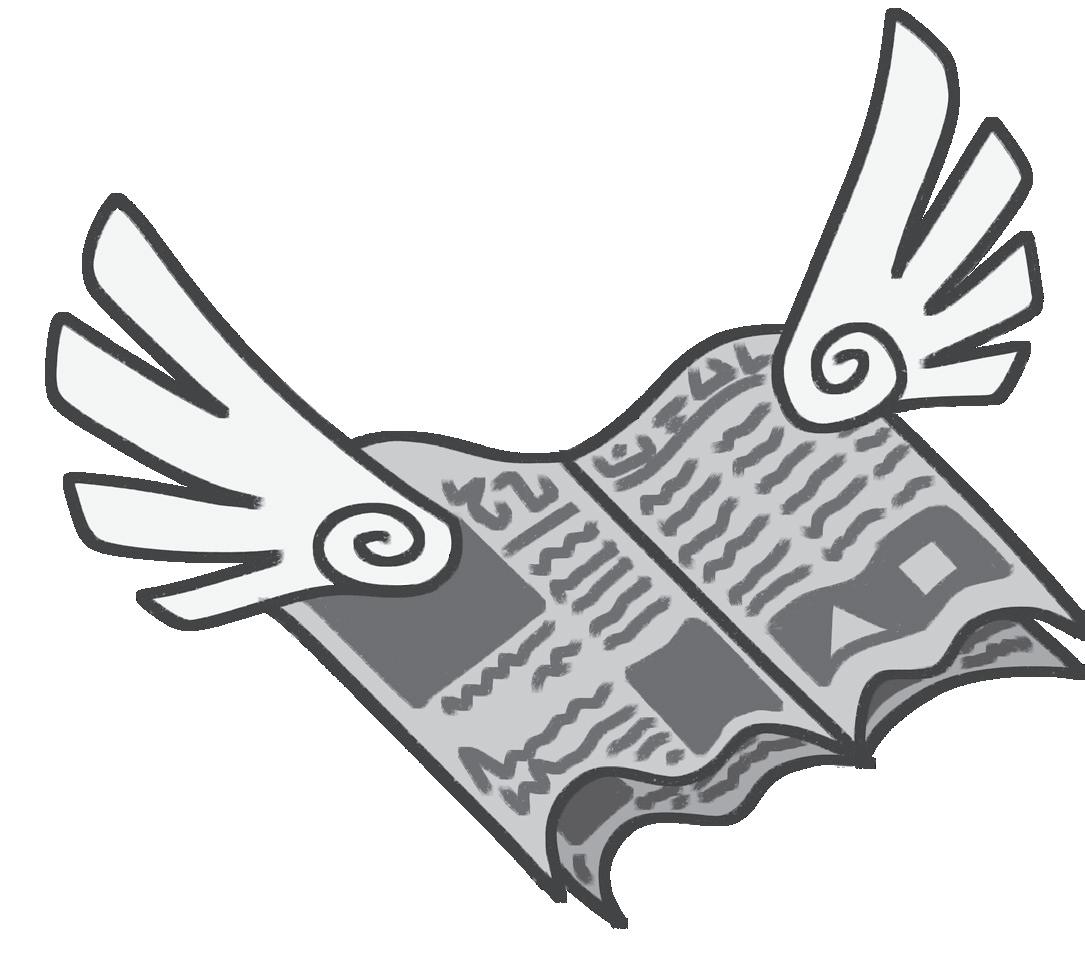
news publication, what’s stopping him from silencing student voices or any dissenters at all?
We need to support journalism in all of its forms from student journalism to local journalism and beyond. One way to support journalism is to encourage your school to fund journalism programs, as

The Student Press Law Center supports and defends student journalists’ free press rights and provides legal support and resources to student publications. On March 28, the SPLC released a statement condemning the arrest of Tufts University student Rumeysa Ozturk which observers fear may have occurred in response to her expressing support to Palestinians over the war in Gaza. To continue fighting for student press rights, we encourage you to donate to the SPLC.
journalism programs often get cut due to underfunding. Additionally, you can support and donate to organizations that stand up for student press freedom like the Student Press Law Center which protects student journalists from censorship. The fight to defend the First Amendment starts with us.



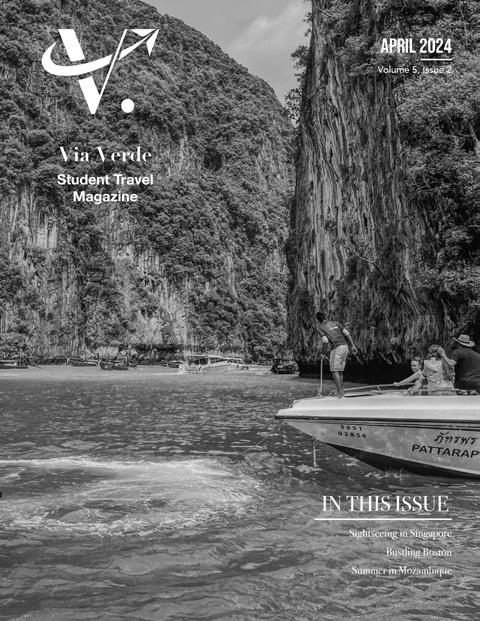

Chomp’s April issue contains everything there is to know about the world of food in the Bay Area. Some notable coverage includes reviews of hidden cafes, the stories of people with a passion for food, and news on the latest restaurants.
Editor-in-Chief: Shreyas Shashi and Augustus Soedarmono
Submit your story ideas to chompmagazine2@gmail.com
Via Verde is Paly’s travel magazine, showcasing photos and telling tales from the travels of students. In our latest issue, stories ranging from ski resorts in California to the cities of Singapore will be featured.
Editor-in-Chief: Anika Nair
Submit your travel photos and stories to:
viaverdemagazine@gmail.com
Palo Alto High School’s Incubator journalism class is currently home to seven publications: Anthro Magazine, Chomp, Ink, Via Verde, Vertias, KPLY, and the Paly Voice. Anthro Magazine has compiled some of the content these publications have recently produced to give a taste of what our class has been doing. We encourage you to check out each of these publications!


In our April issue of Ink, writers explore what nature means to them, whether it be through the great outdoors or their own inner spirit. Various works of writing reveal the unique meaning of nature to different people.
Editor-in-Chief: Sarina Grewal and Salem Coyle
Submit your writing to : literarymagazineink@gmail. com
Our April issue of Veritas follows its typical science and technology theme. Some featured stories include students in STEM and their journey to college, labs in the 1700s, and the science of wildfires.
Editor-in-Chiefs: Vivian Tang and Divij Motwani
Submit your story ideas to: veritas.paly@gmail.com
KPLY is Paly’s online podcasting publication, providing weekly campus updates via Quad Talks and features on campus culture. KPLY covers everything from cultural analysis to current events and student opinions. Listen on Soundcloud, Spotify, or Apple Podcasts: KPLY Paly Radio
Executive Producer: Mack Reller

The Paly Voice is our 24/7 online news publication, providing quick and concise coverage throughout the school year. From school athletics to community controversies, The Paly Voice reports on a wide range of local subjects.
Editor-in-Chiefs: Celina Lee, Kristine Lin, and Nathan Jiang
Visit at: palyvoice.com

Magazines include: Anthro, Via Verde, Veritas, Ink, Proof, Chomp



